Index (from top to Bottom of page):
- Reflections from Spotify Trek
- Trek to Spotify Offices in Flatiron
- Google HQ: A Coworking Space for Entrepreneurs
- Trekkers Respond to their Google Visit
- Shawn Buessing, a Google Engineering Manager, speaks to a question from a trekker, "Are you worried children have become too dependent on technology?" (video)
- Trek to Google HQ in Chelsea
- Reflections from Silicon Alley Trek Participants -- Mass Lab
- From Concept to Creation: Notes and Reflections From the Founder
- Silicon Alley Takes Its First Trek to Mass Lab, Creators of Ocho Video
- An Abridged Q&A with Jourdan Urbach
- Jourdan Urbach Tackles the Question, "How Should an Aspiring Entrepreneur Use His or Her Time in College?" (video)
- Jourdan Urbach’s Take on the “Wild West” Hecticness of Startups (video)
March 18, 2016 -- Reflections from Spotify Trek
Once more, visiting Spotify provided a unique perspective into the world of startups. Despite being established about 10 years ago, Spotify is growing rapidly counting over 20 million paid subscribers and 1,800 employees. The company is aggressively hiring while bringing their streaming music service into more areas. This growth was one of the biggest themes of the visit. On a more technical level, Spotify is moving their data over to Google Cloud Services in order to cater to their growing user base. In addition, changes are common within the company. We learned that teams are constantly being created to speed up efficiency within the company. Another cool tidbit is Spotify machine-learning and big data capabilities. We met with two data engineers who explained how Spotify uses machine learning to interpret the massive amounts of data that comes from every click. They use this data to power recommendations, playlists and more which help millions of users pick out their music. Spotify is also very active in growing their presence and developing new streams of revenue. In addition to their traditional ad and subscription structure, Spotify is expanding through Uber, Facebook, and partnerships with car companies and more.
The corporate culture of Spotify was also very interesting. Much like Google, there is a sense of openness to new ideas and a culture of encouragement for new projects. The employees also told us about Hack Week where all Spotify employees take a break from their normal work and focus on personal and team projects that don’t even need to be Spotify related. Like many other tech companies, there is a wide variety of perks attached to working at Spotify as well. One of the most unique parts of Spotify’s identity is their transparency. The CEO regularly hosts company wide meetings, new employees travel to the headquarters in Stockholm, and Spotify regularly releases information to the public. Spotify as a whole really exemplified a successful startup with a meaningful attitude and a corporate culture that encourages making the world a better place. It was also really cool to see where one of the biggest new business in tech and music streaming was created. Overall, this was once again a very informative and interesting trek. --Ben Kessler '19
March 17, 2016 -- Trek to Spotify Offices in Flatiron
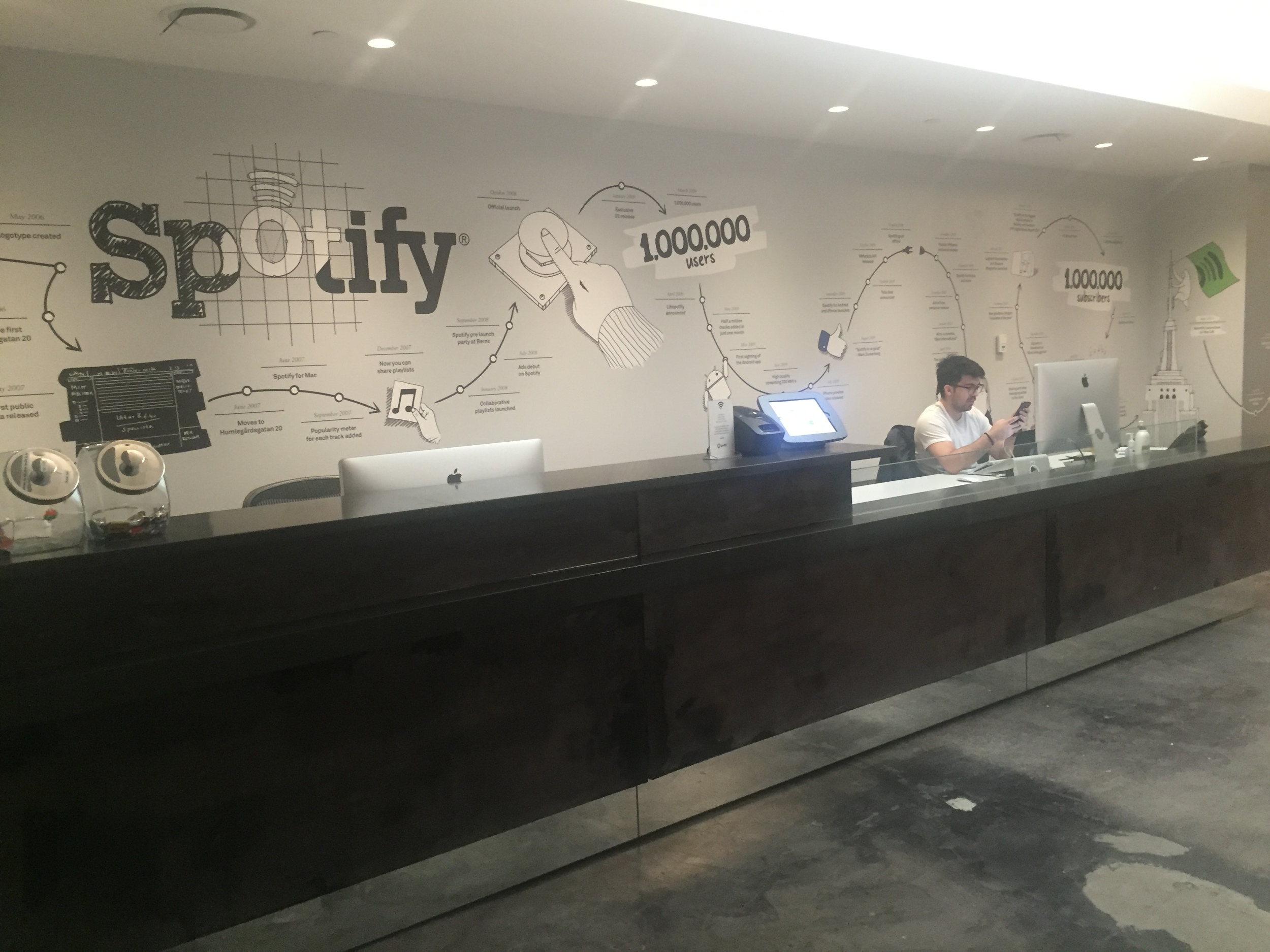
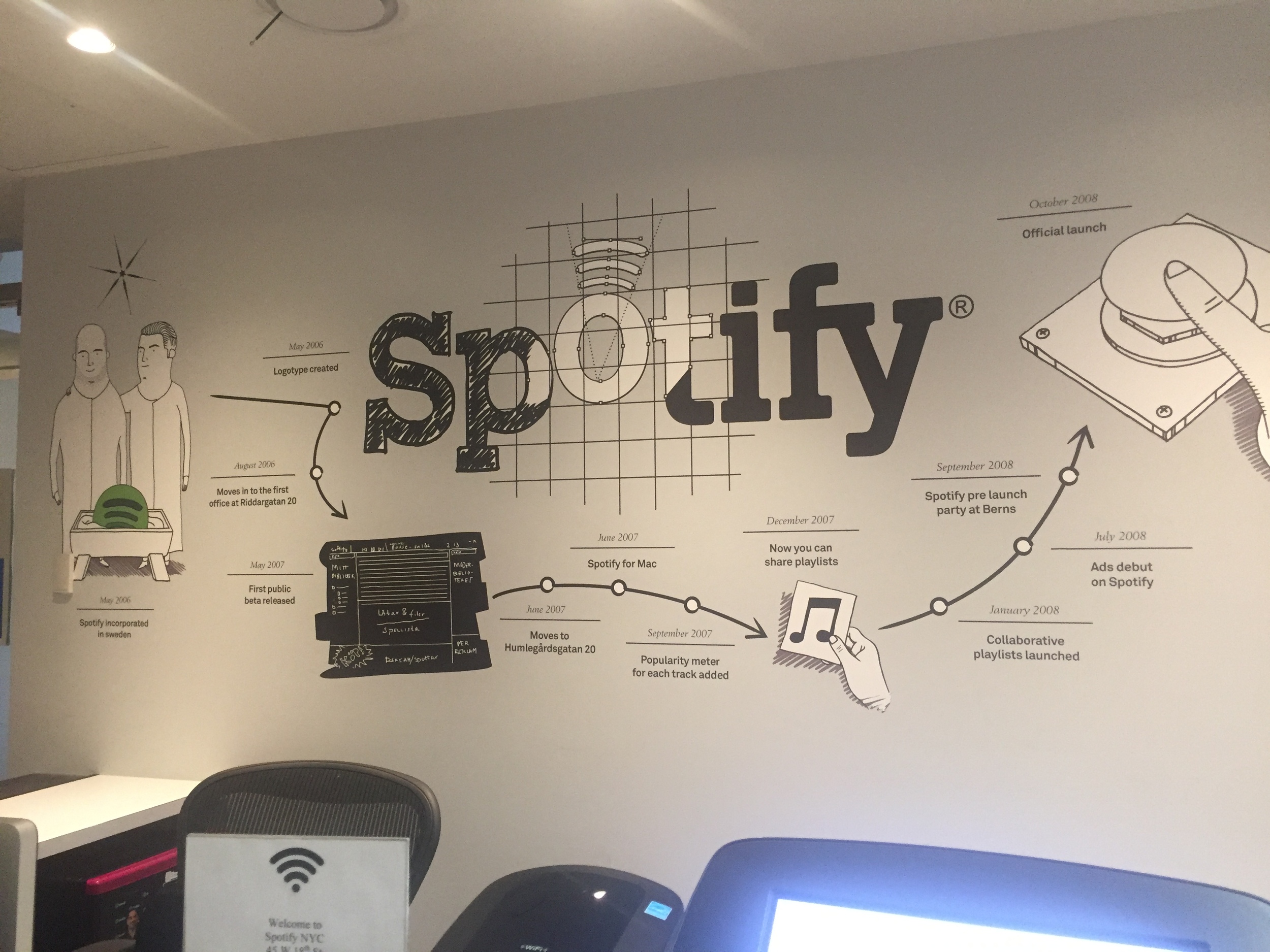
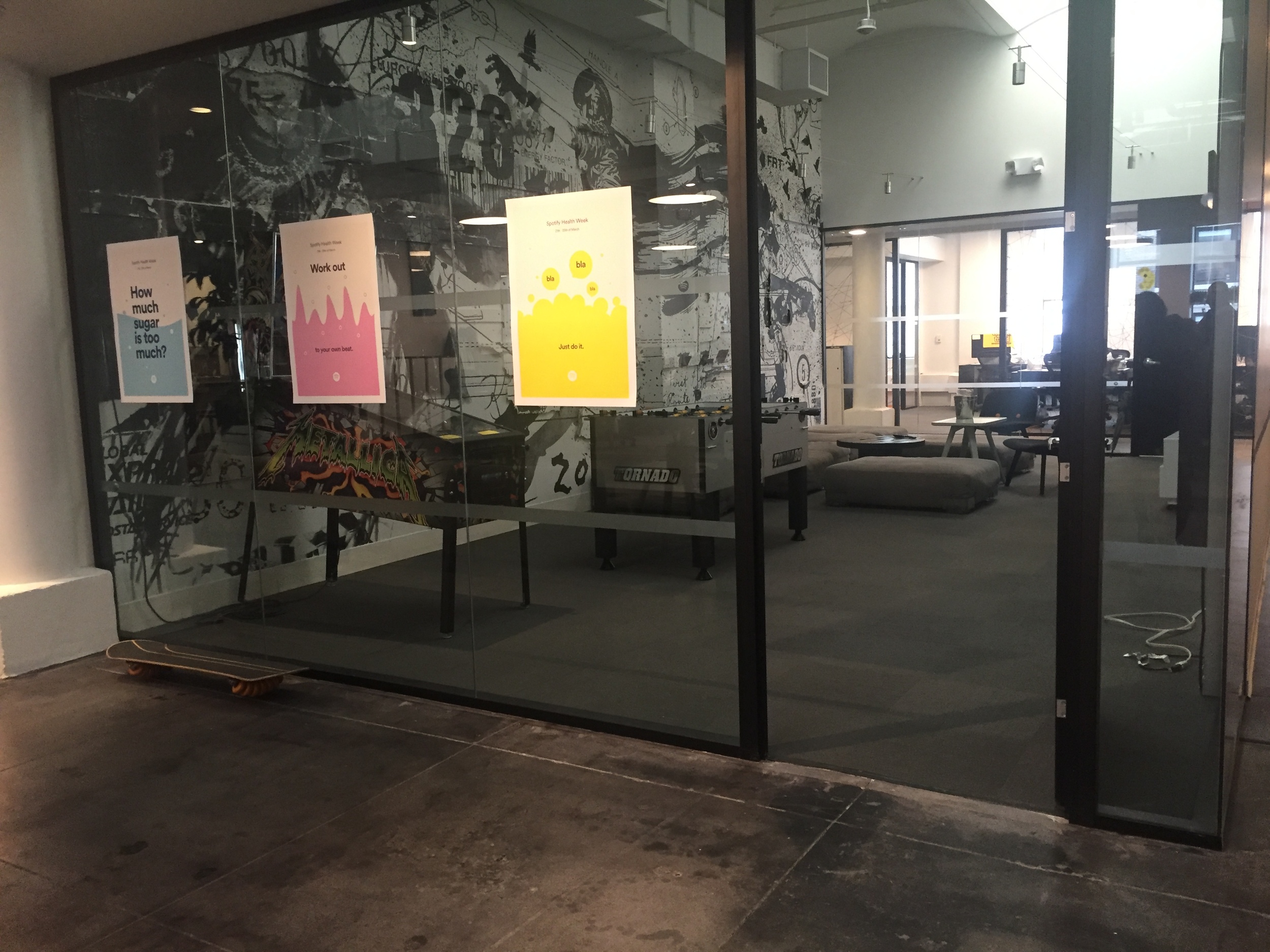
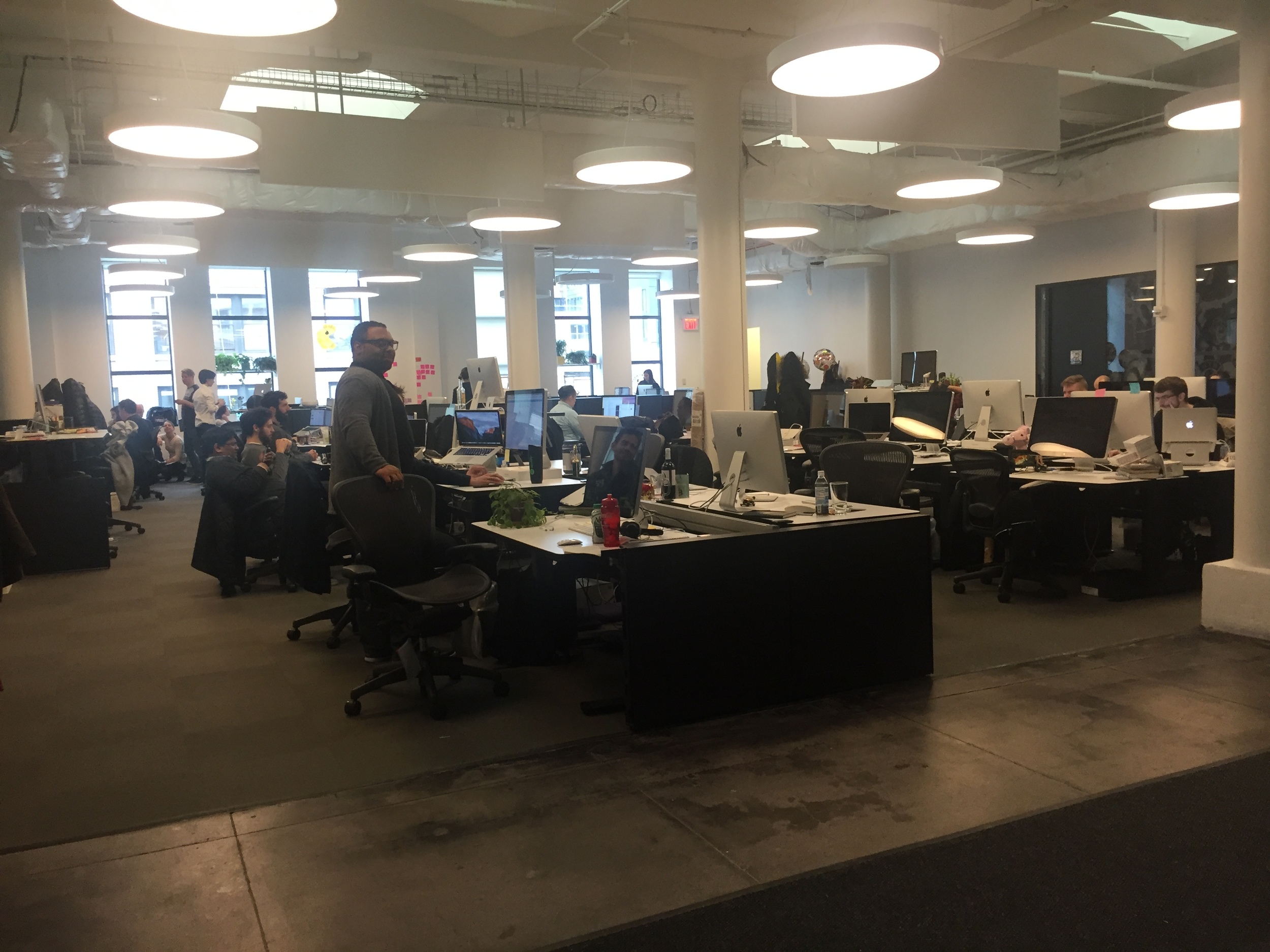
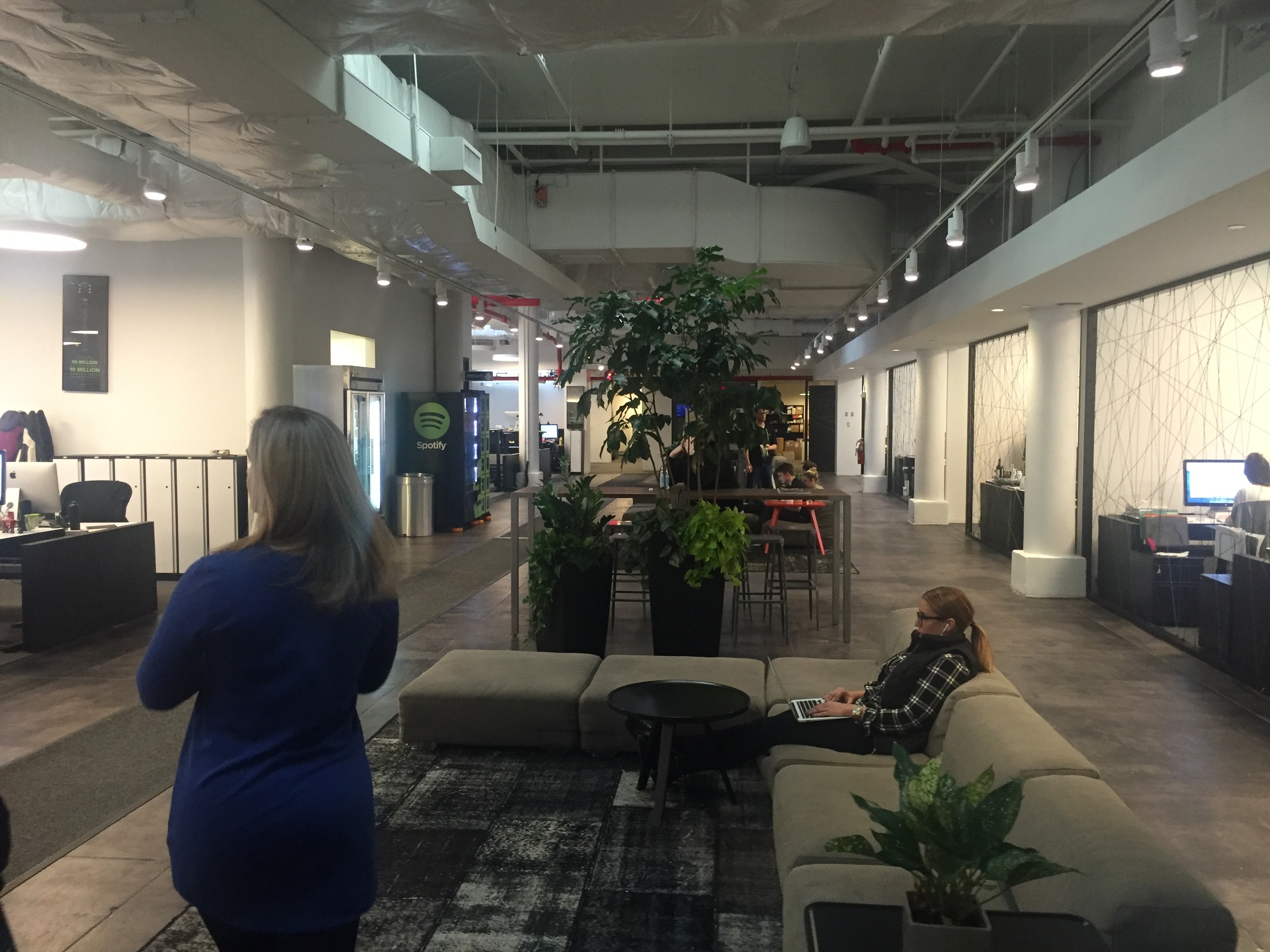
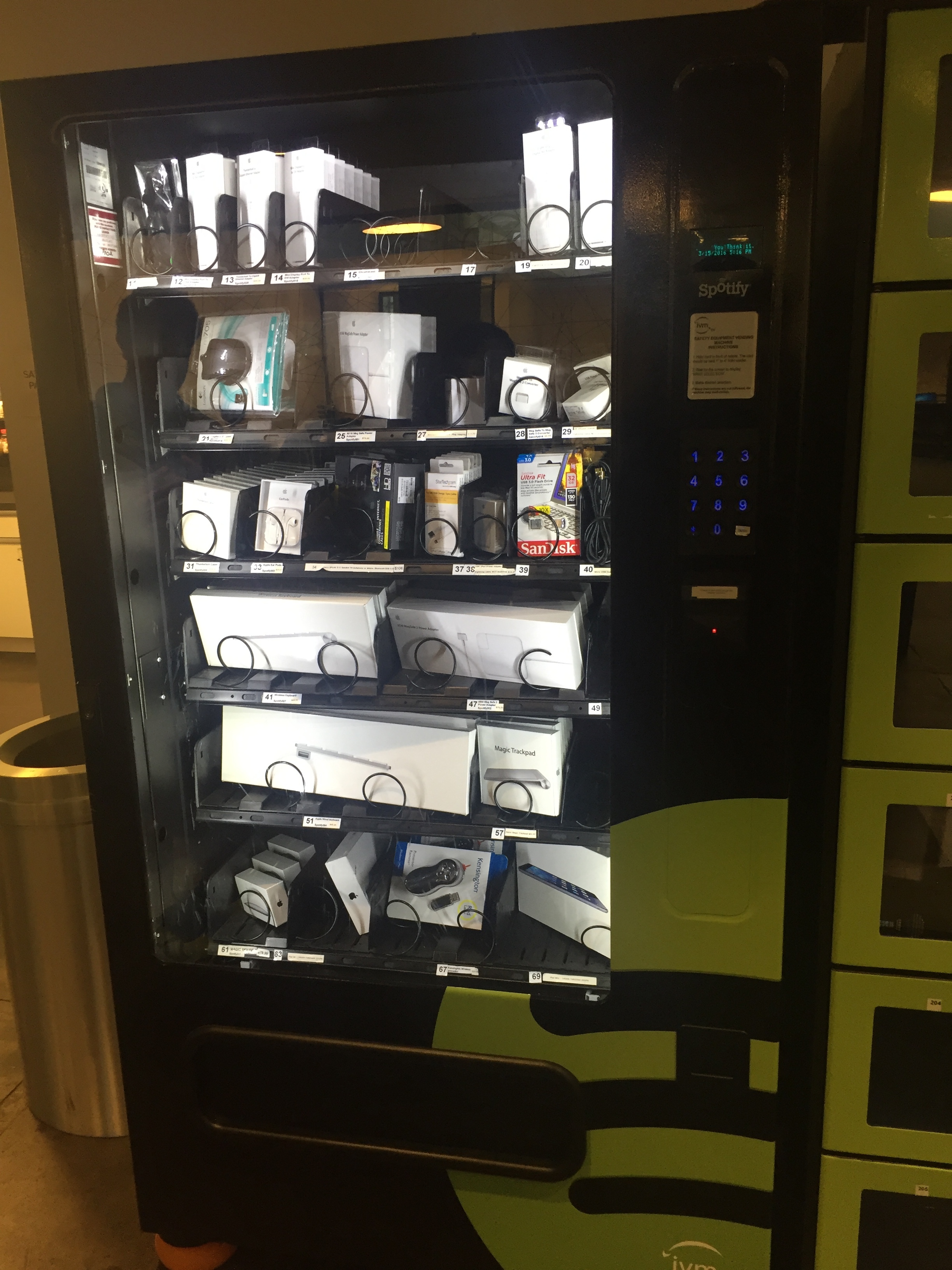
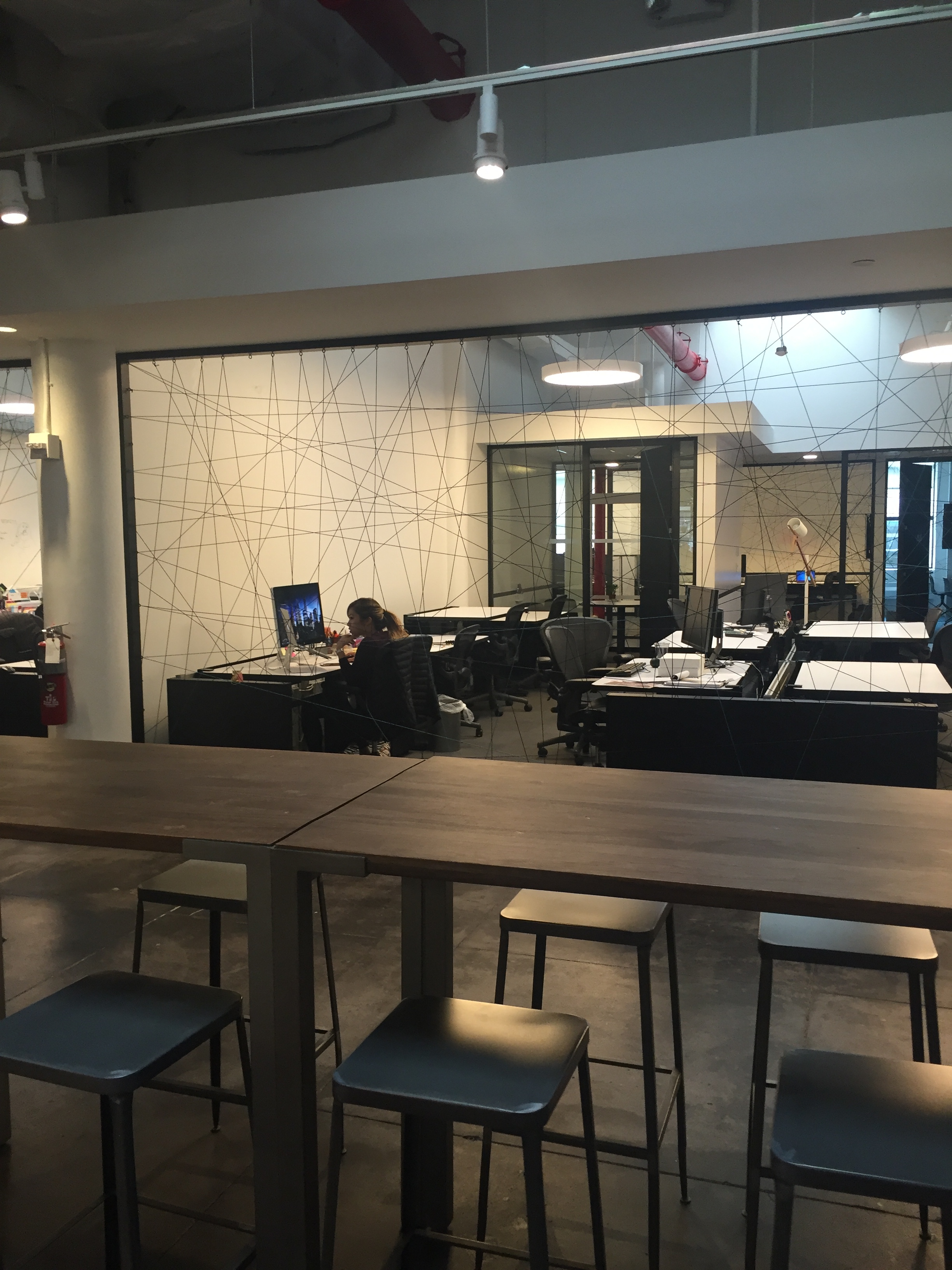
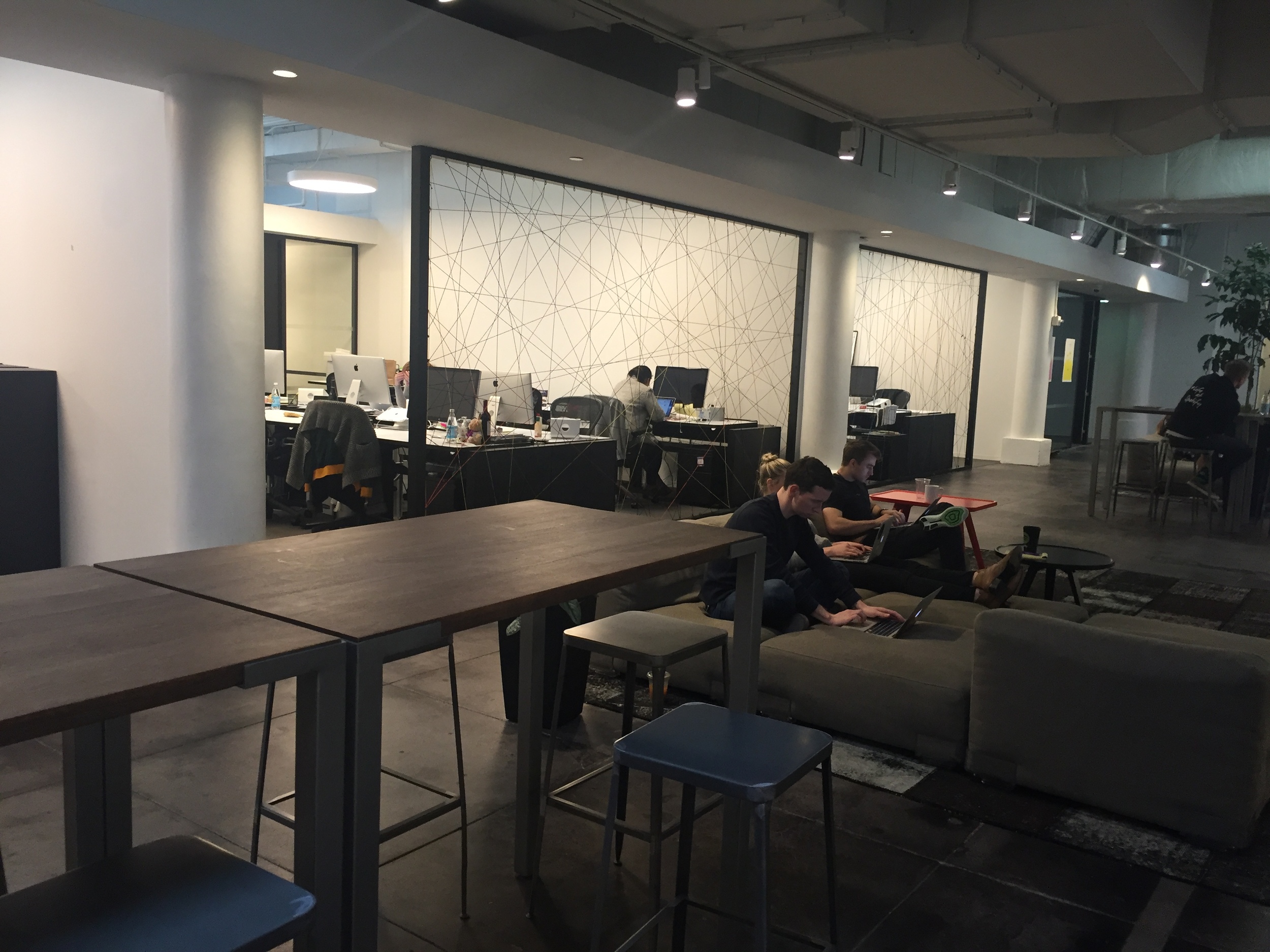
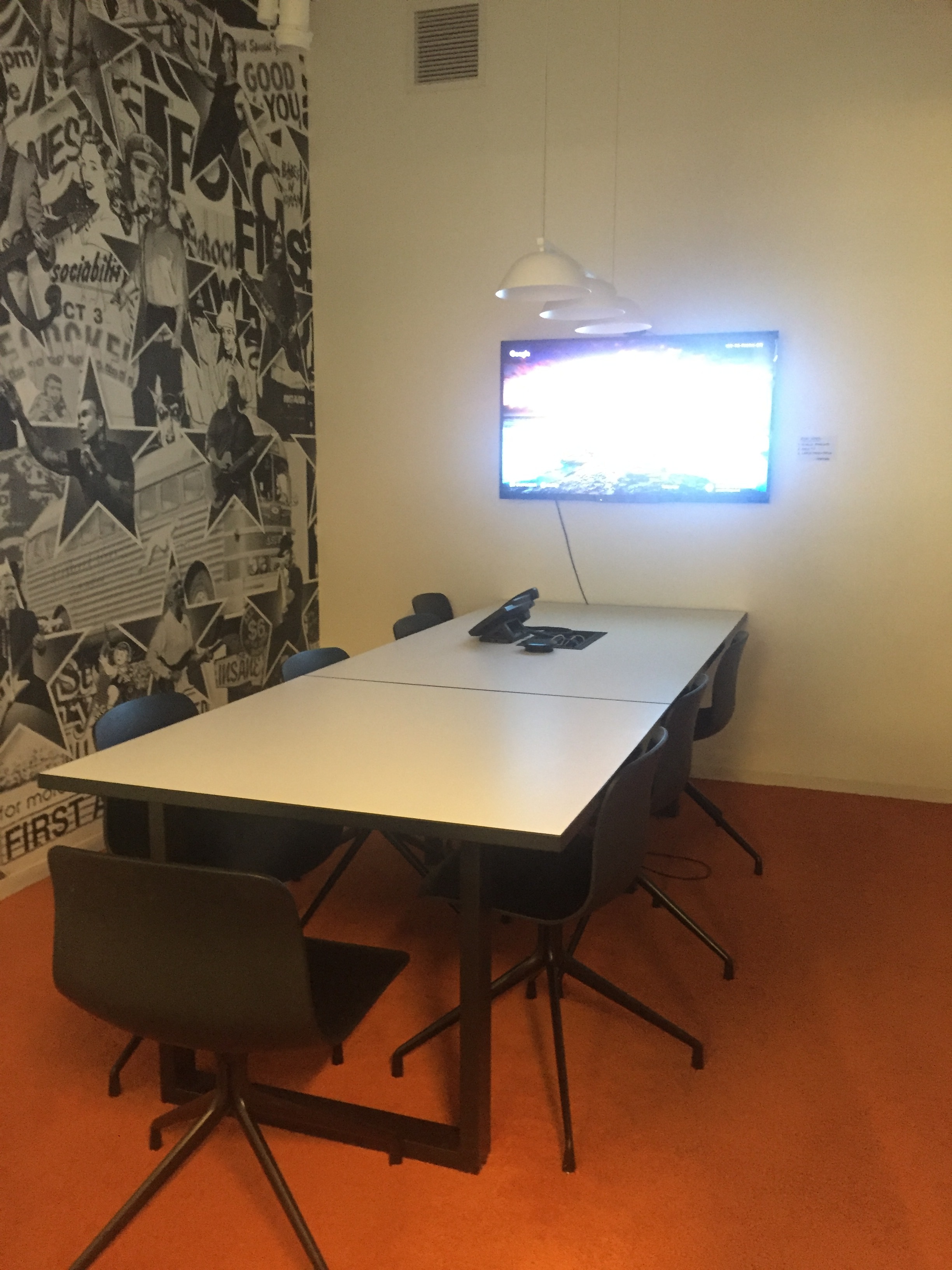
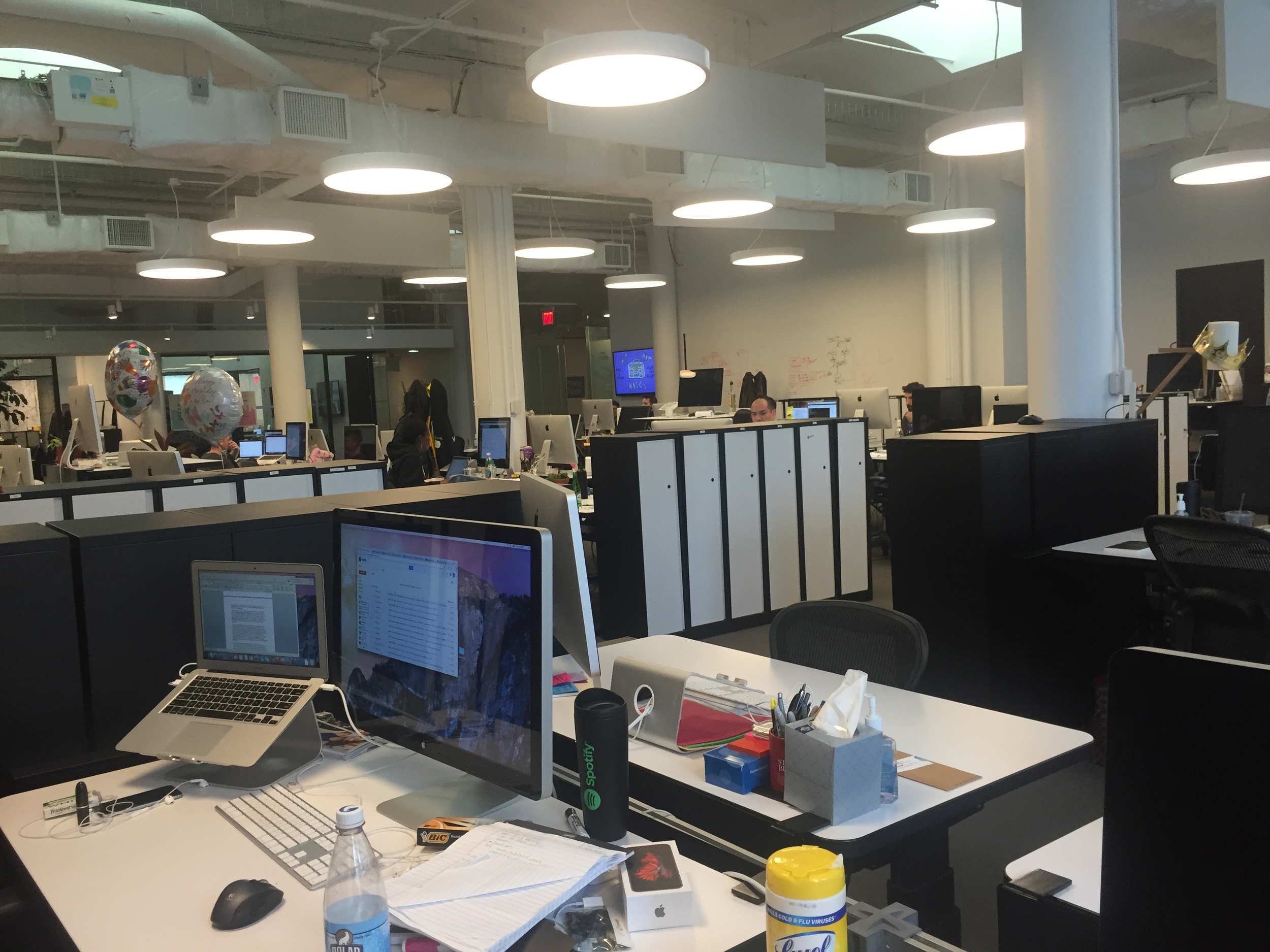
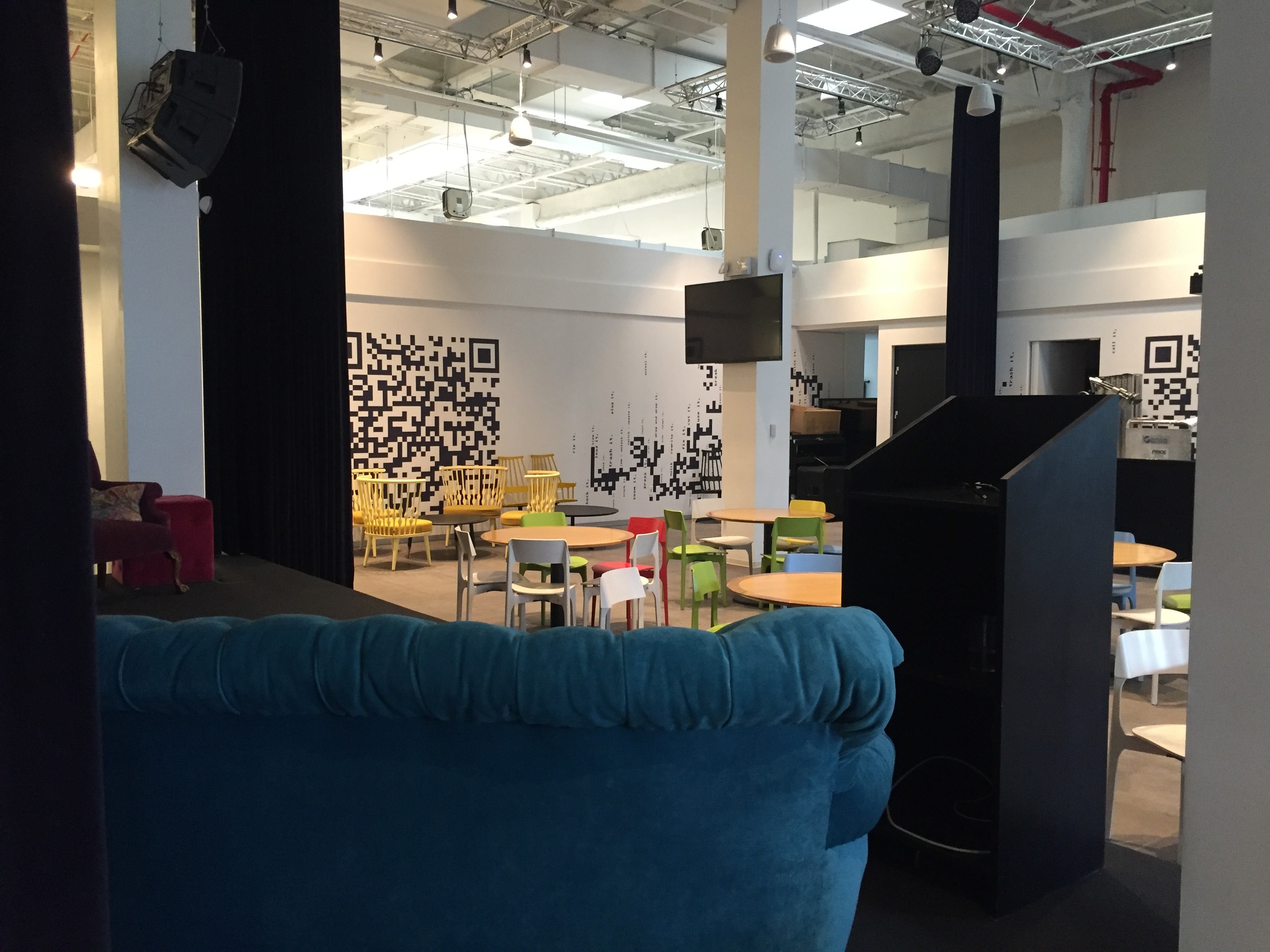
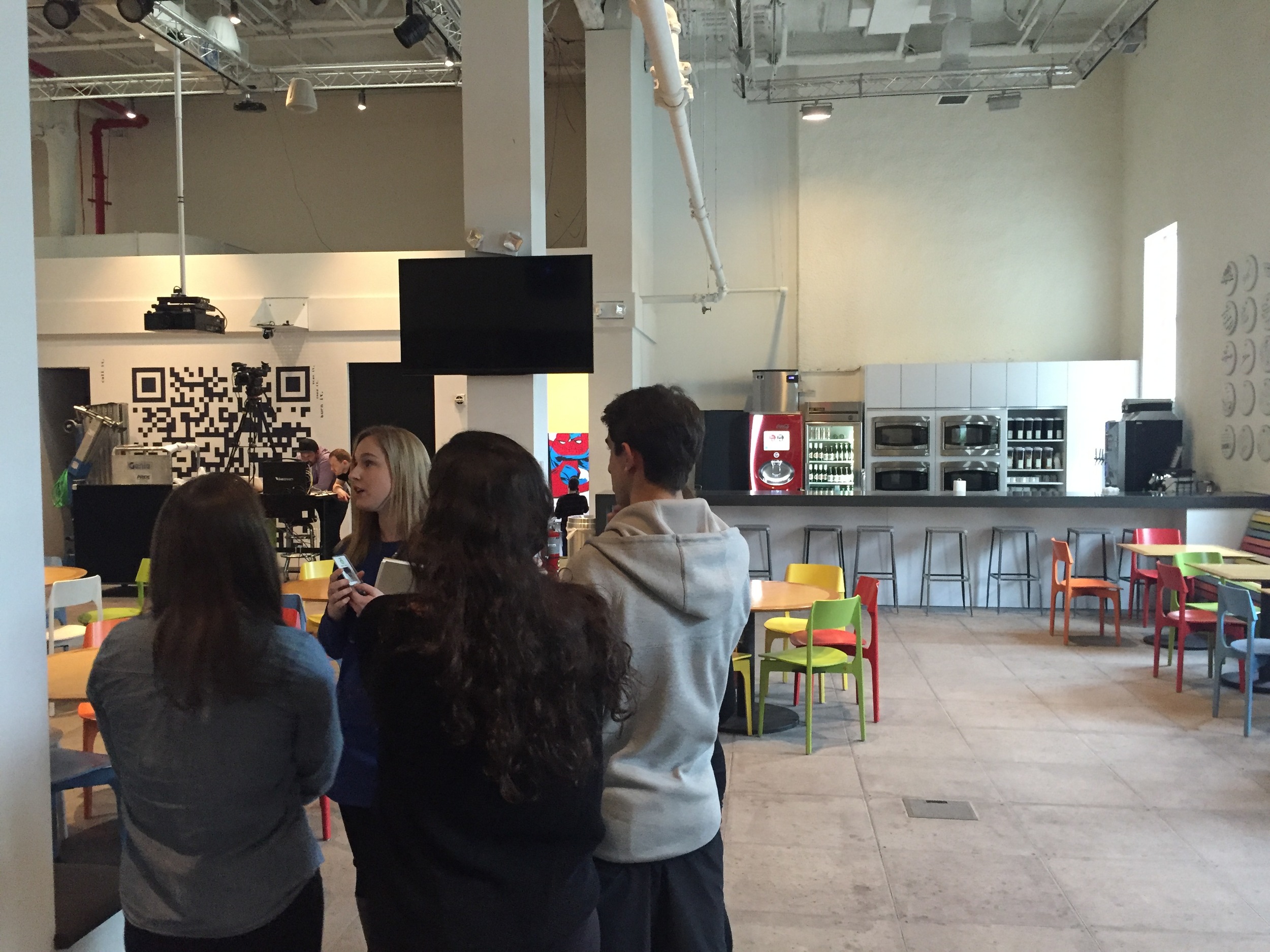
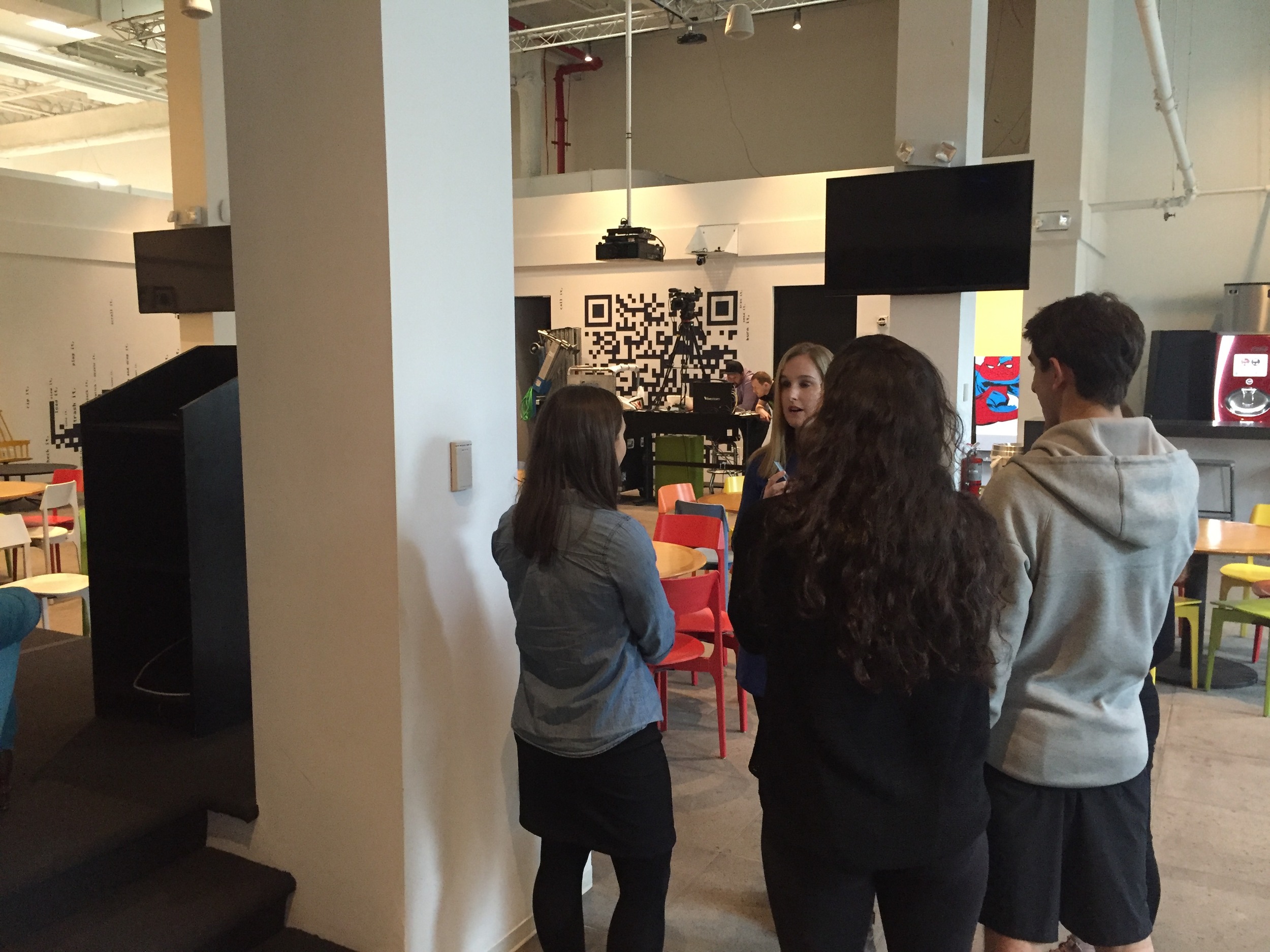
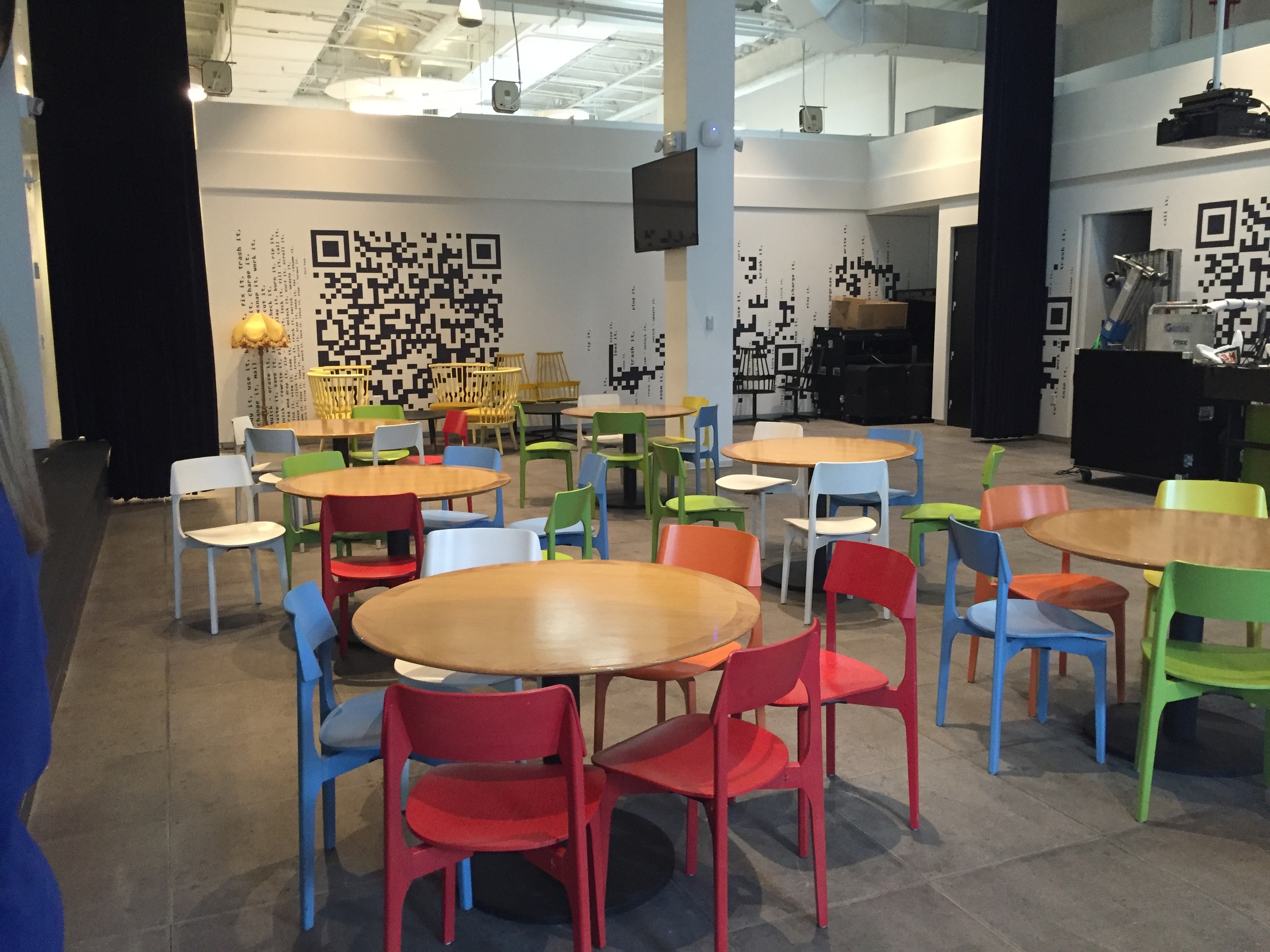
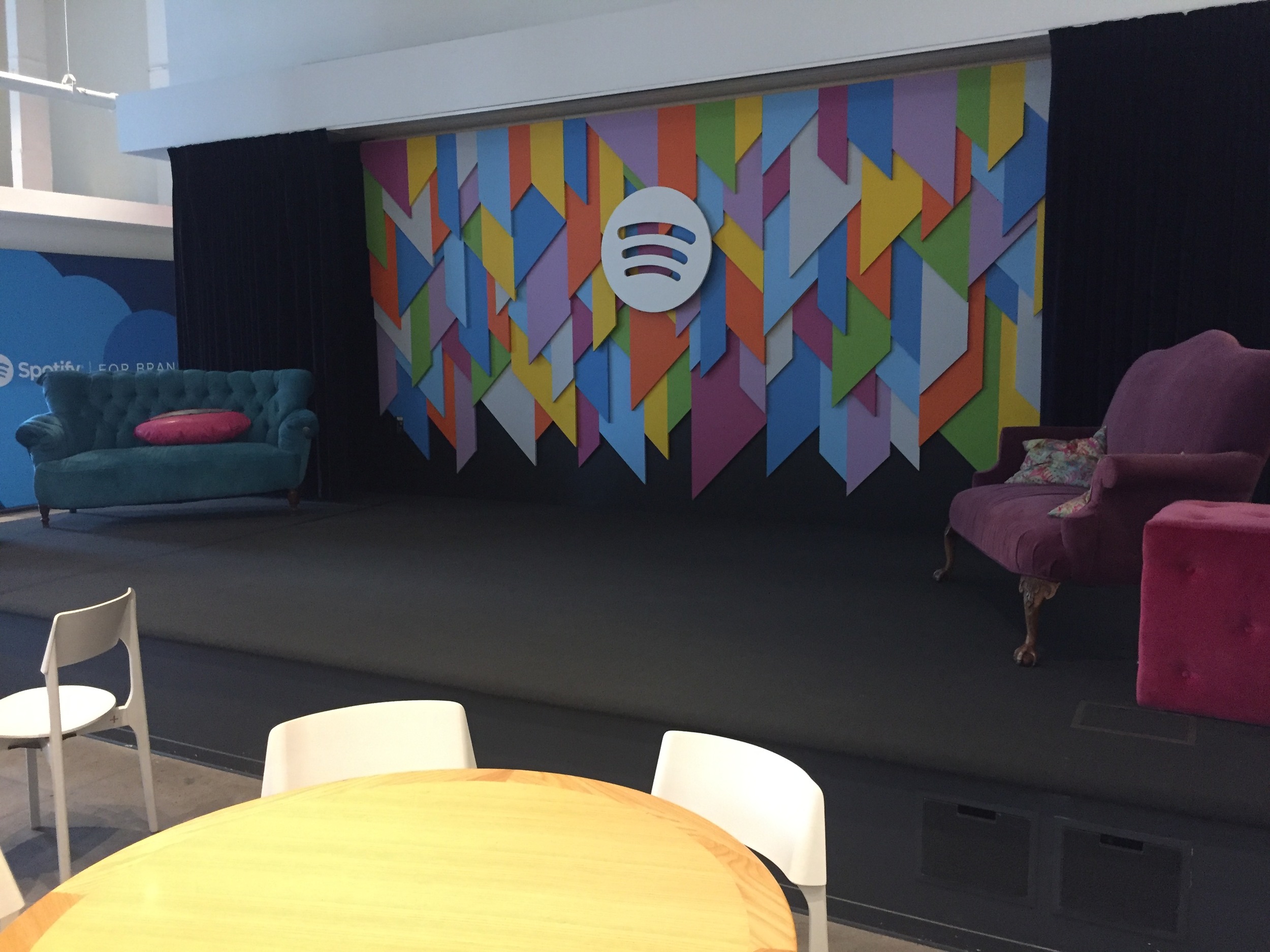
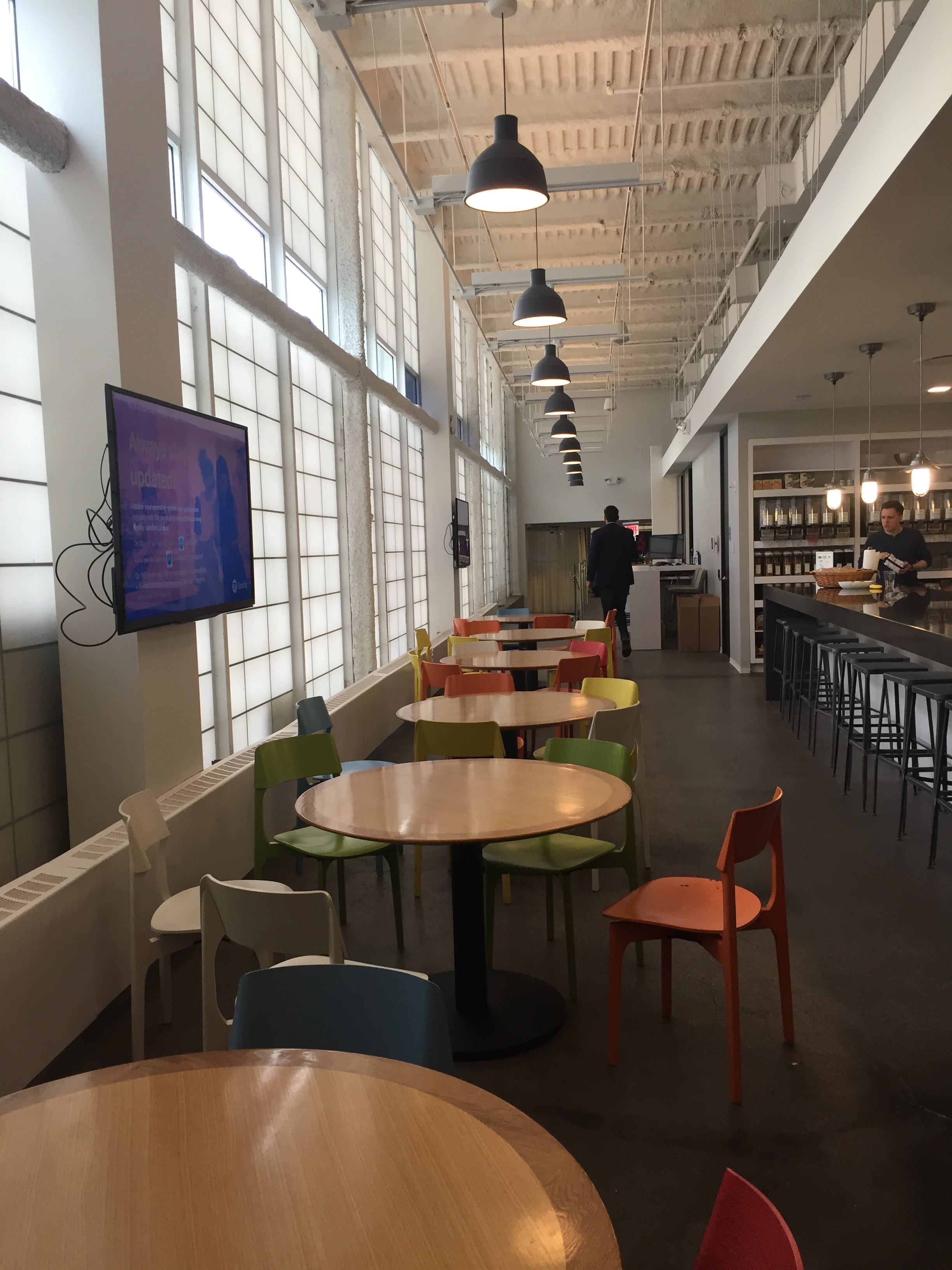
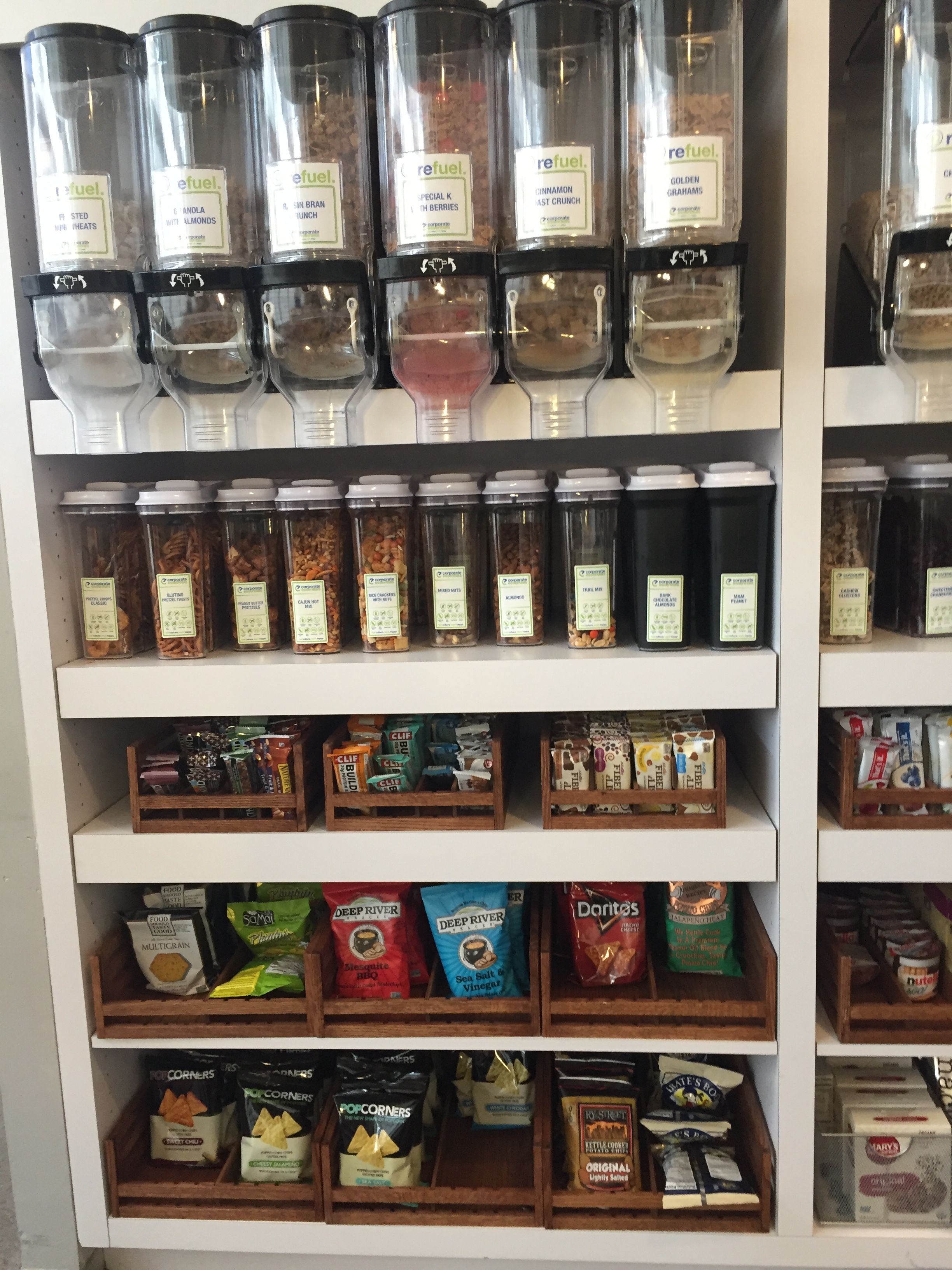

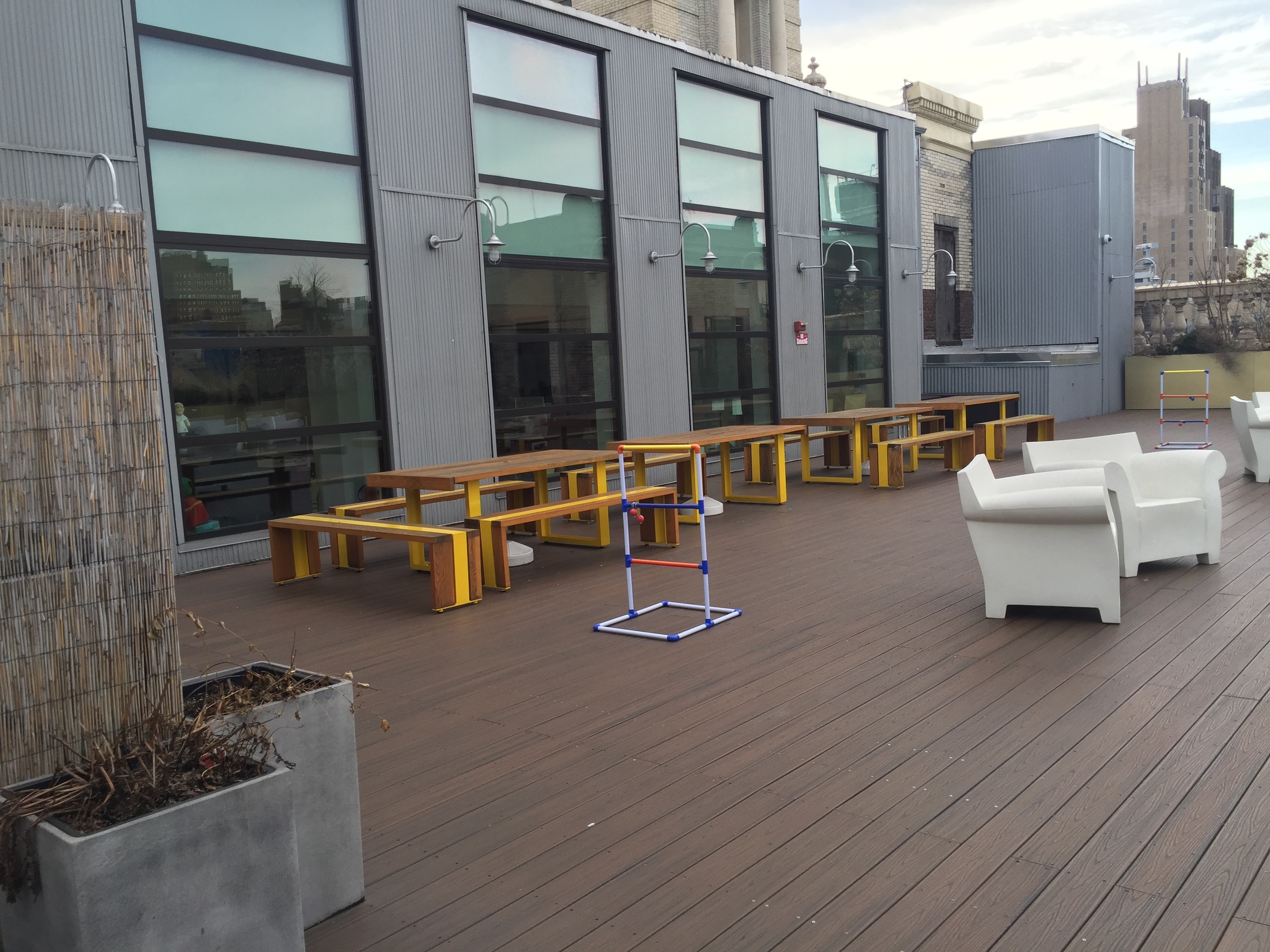
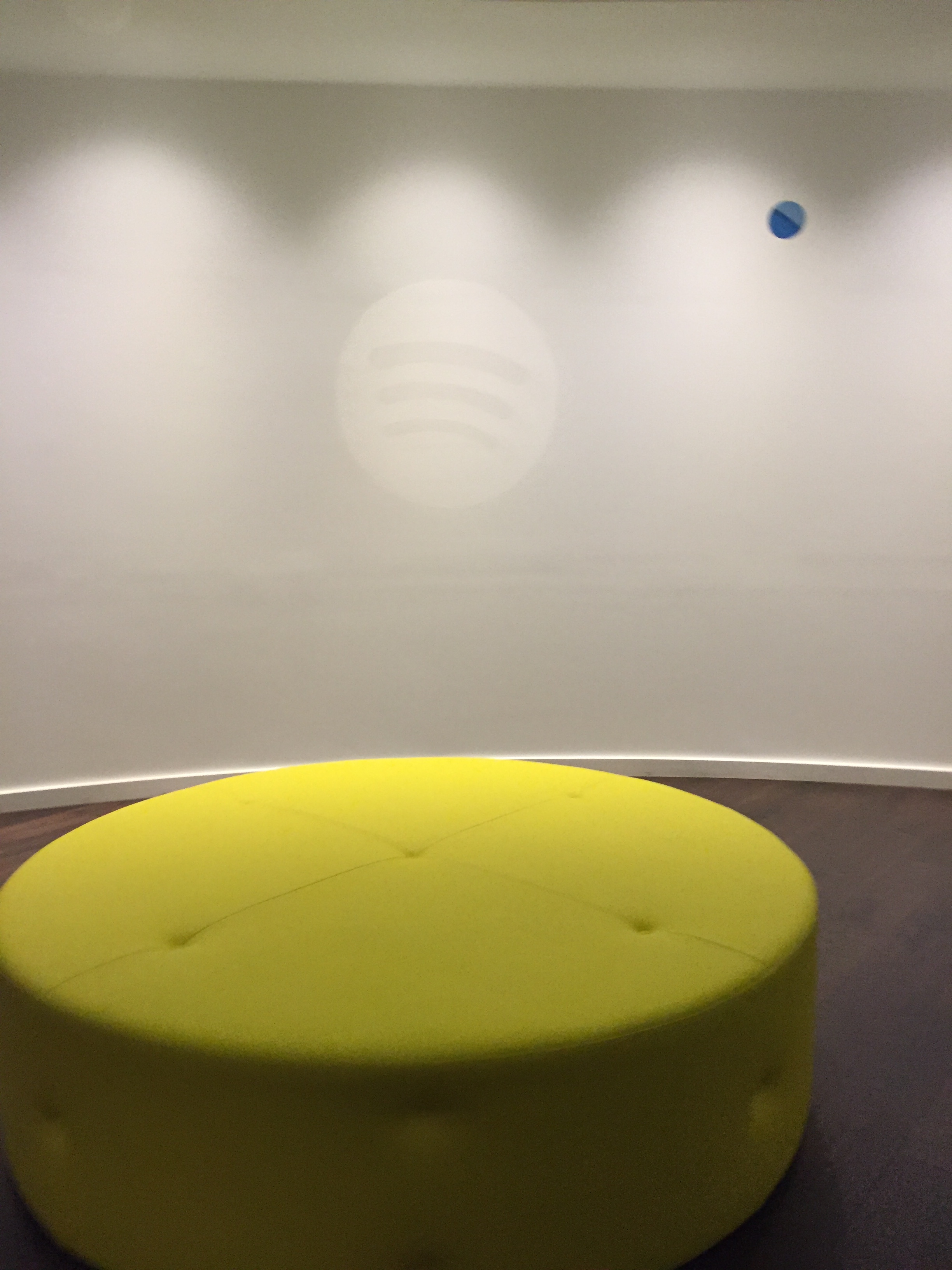
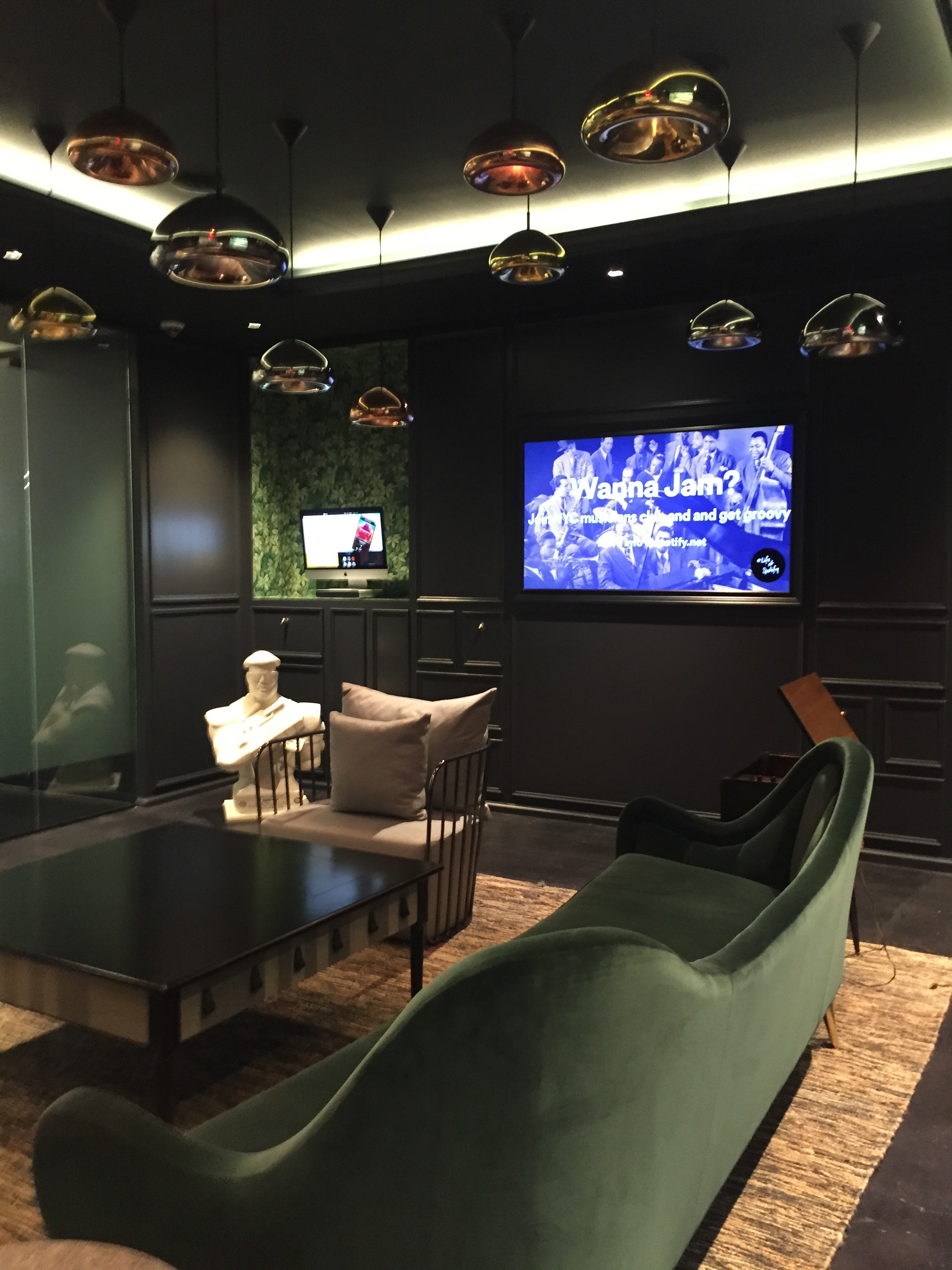
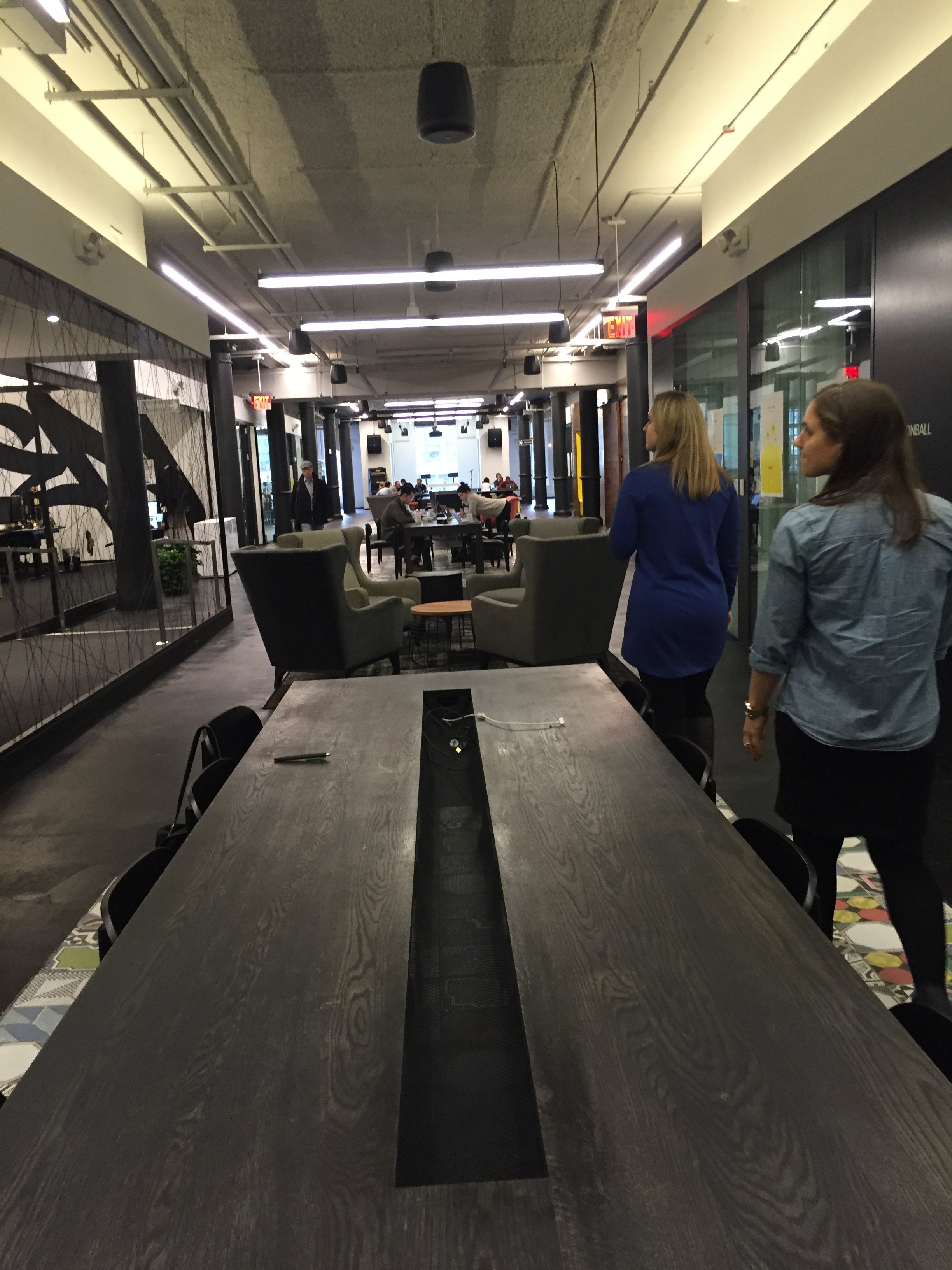
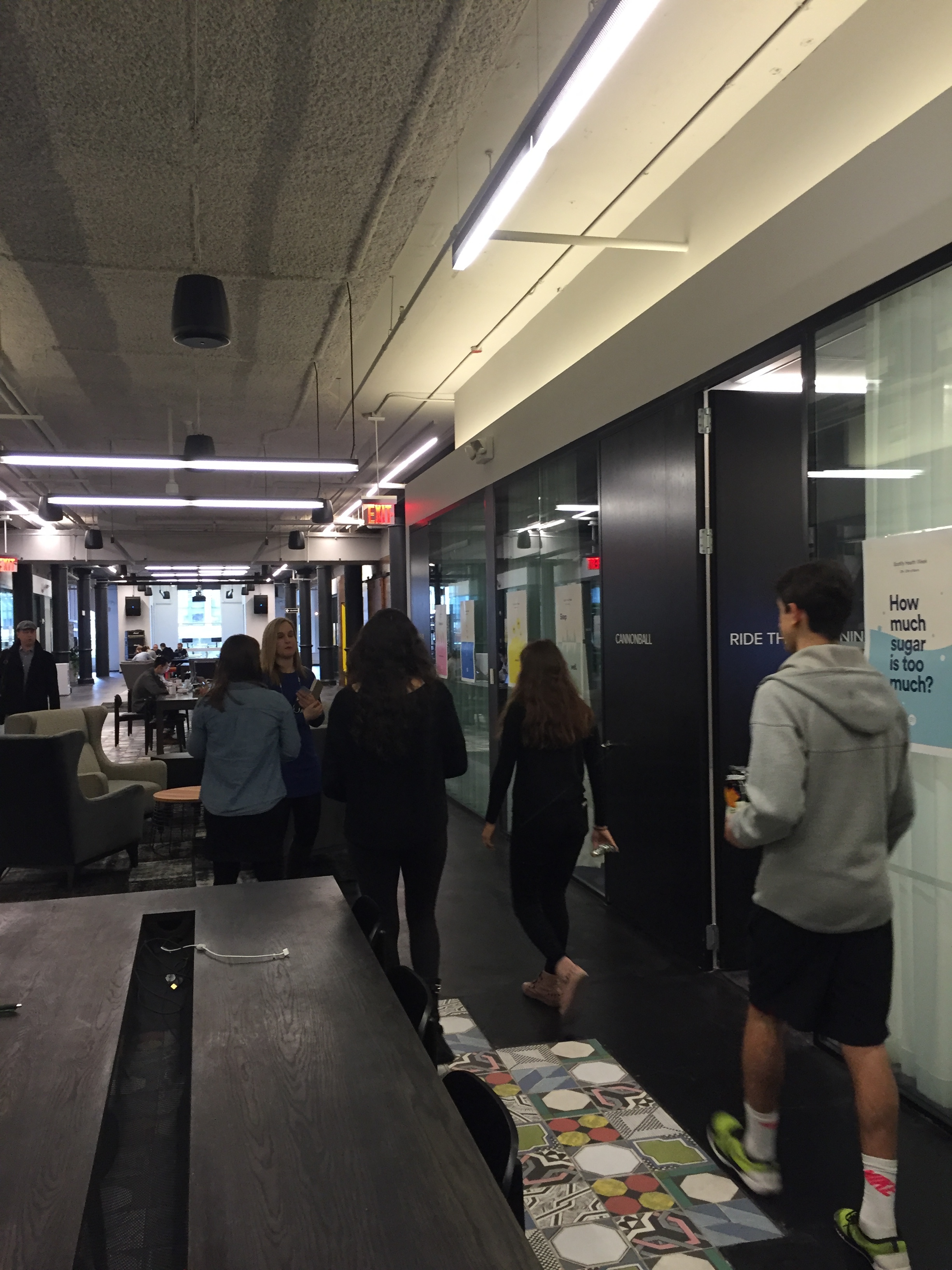
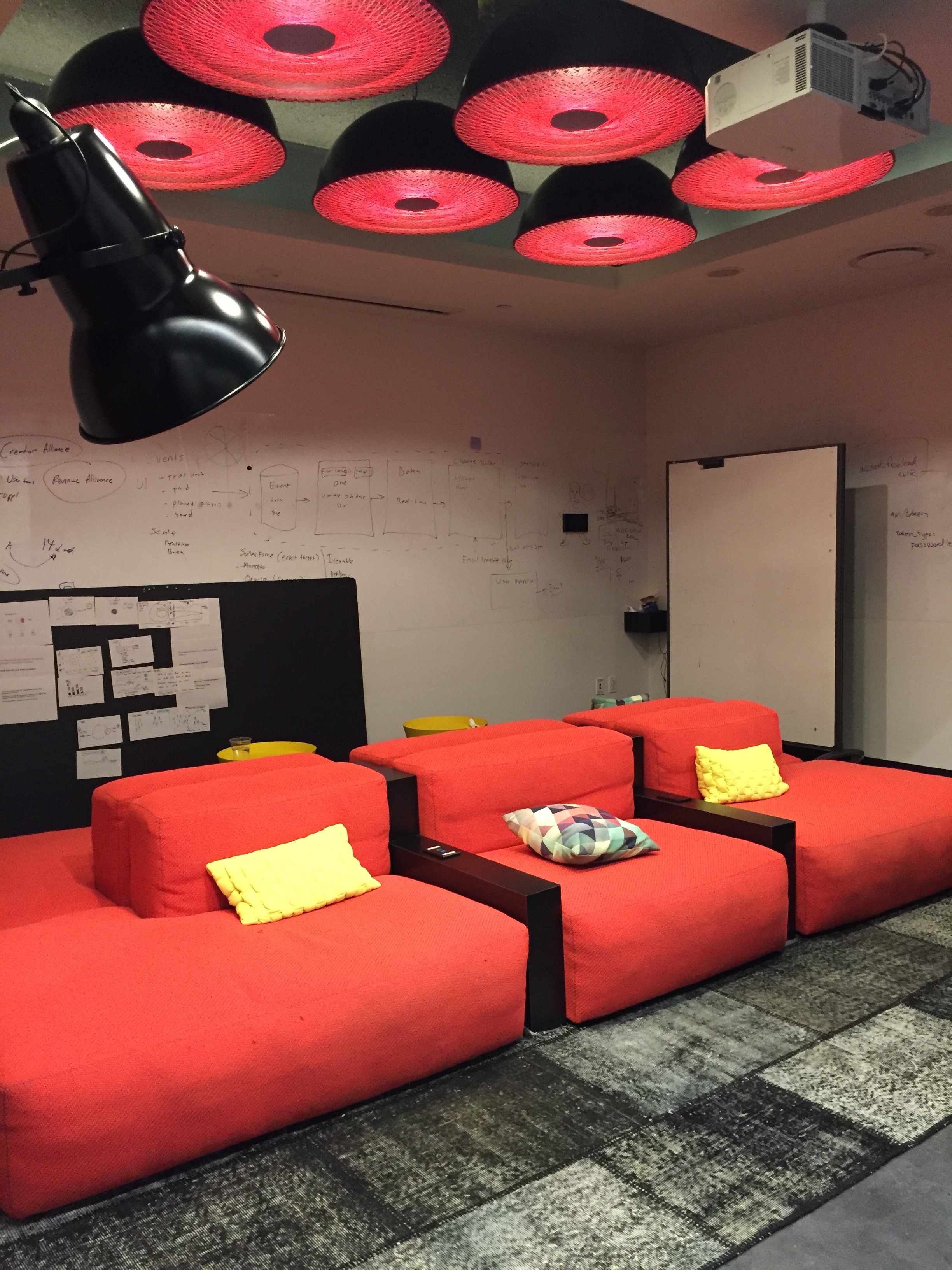
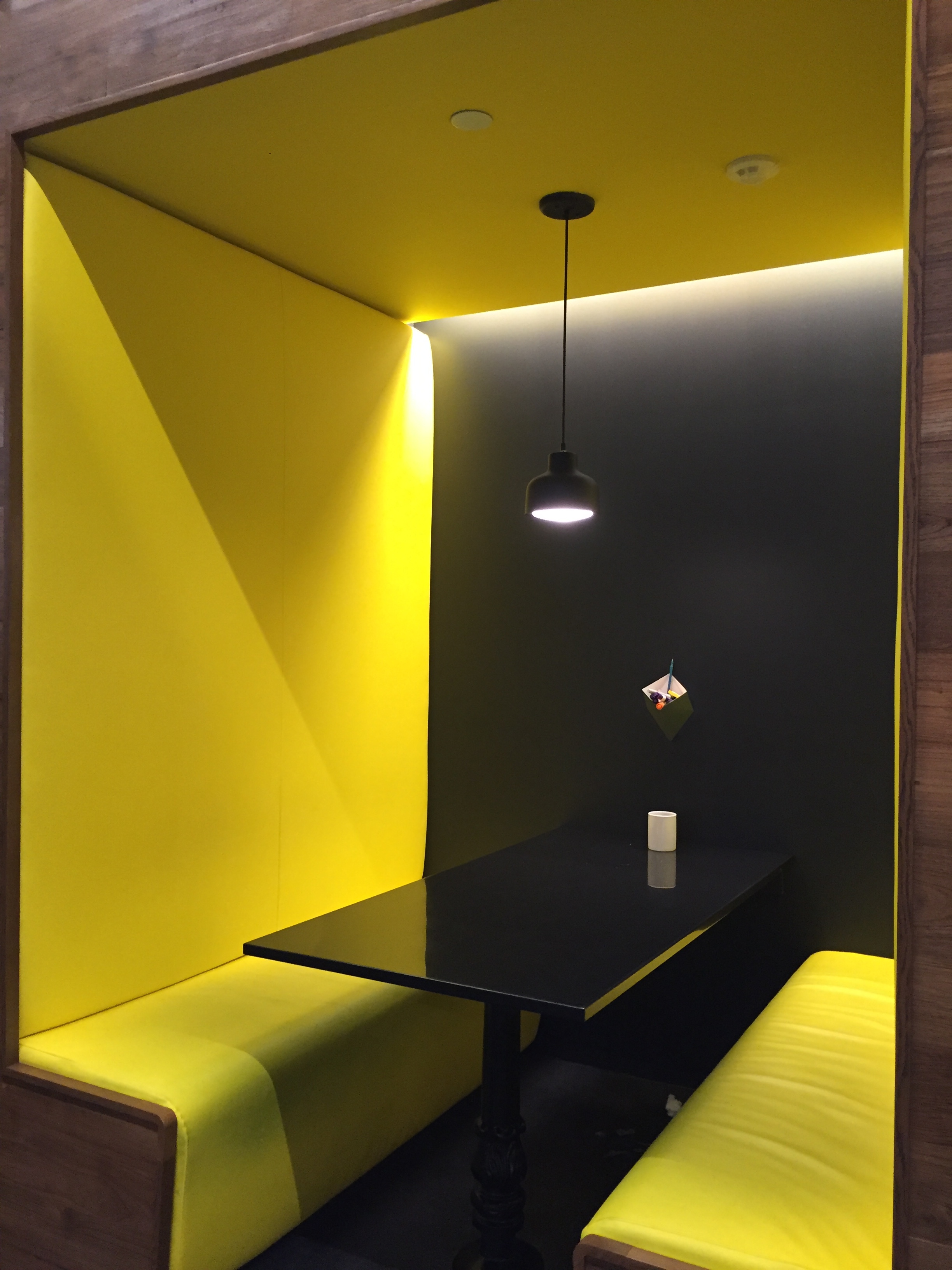
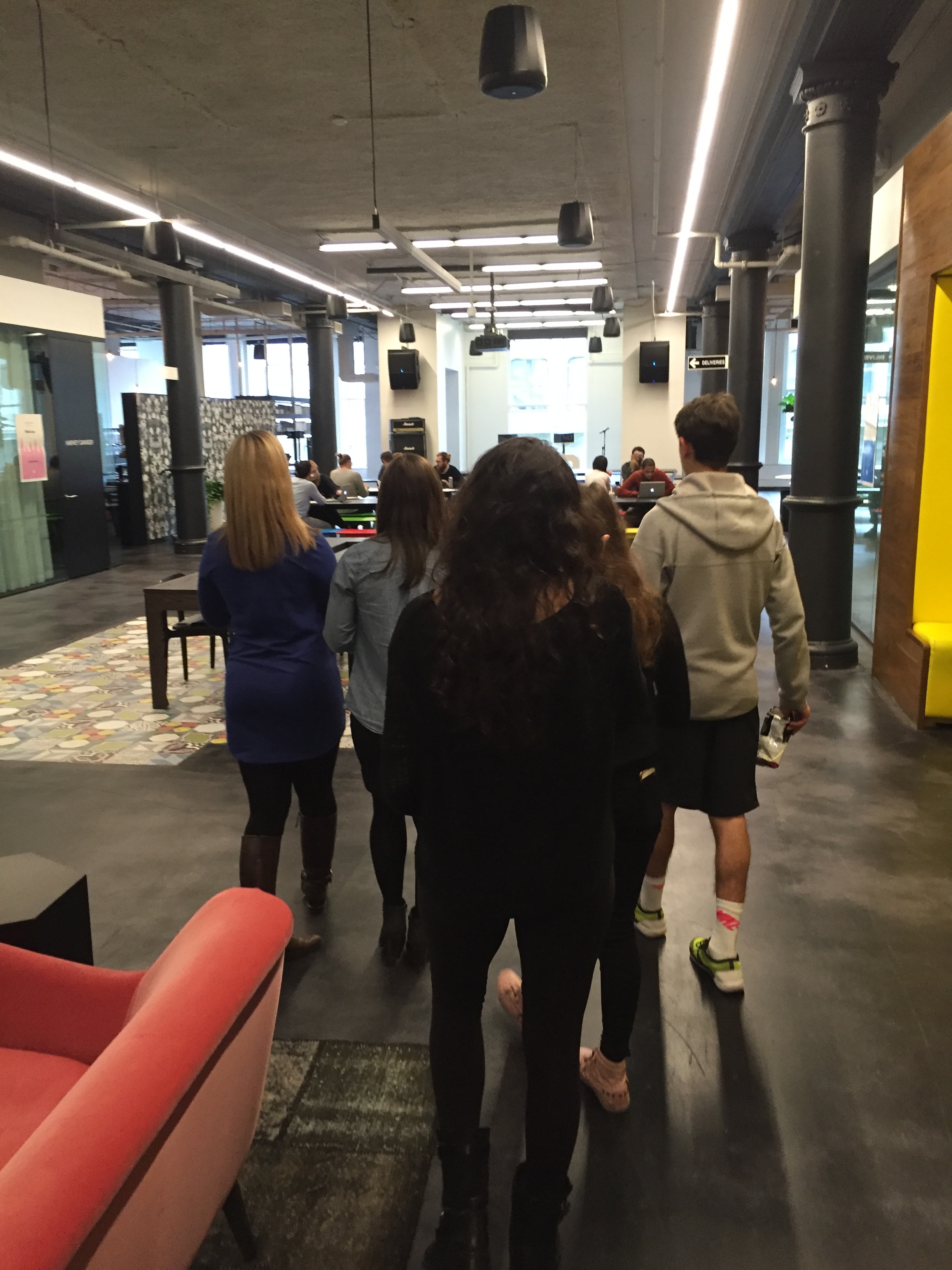
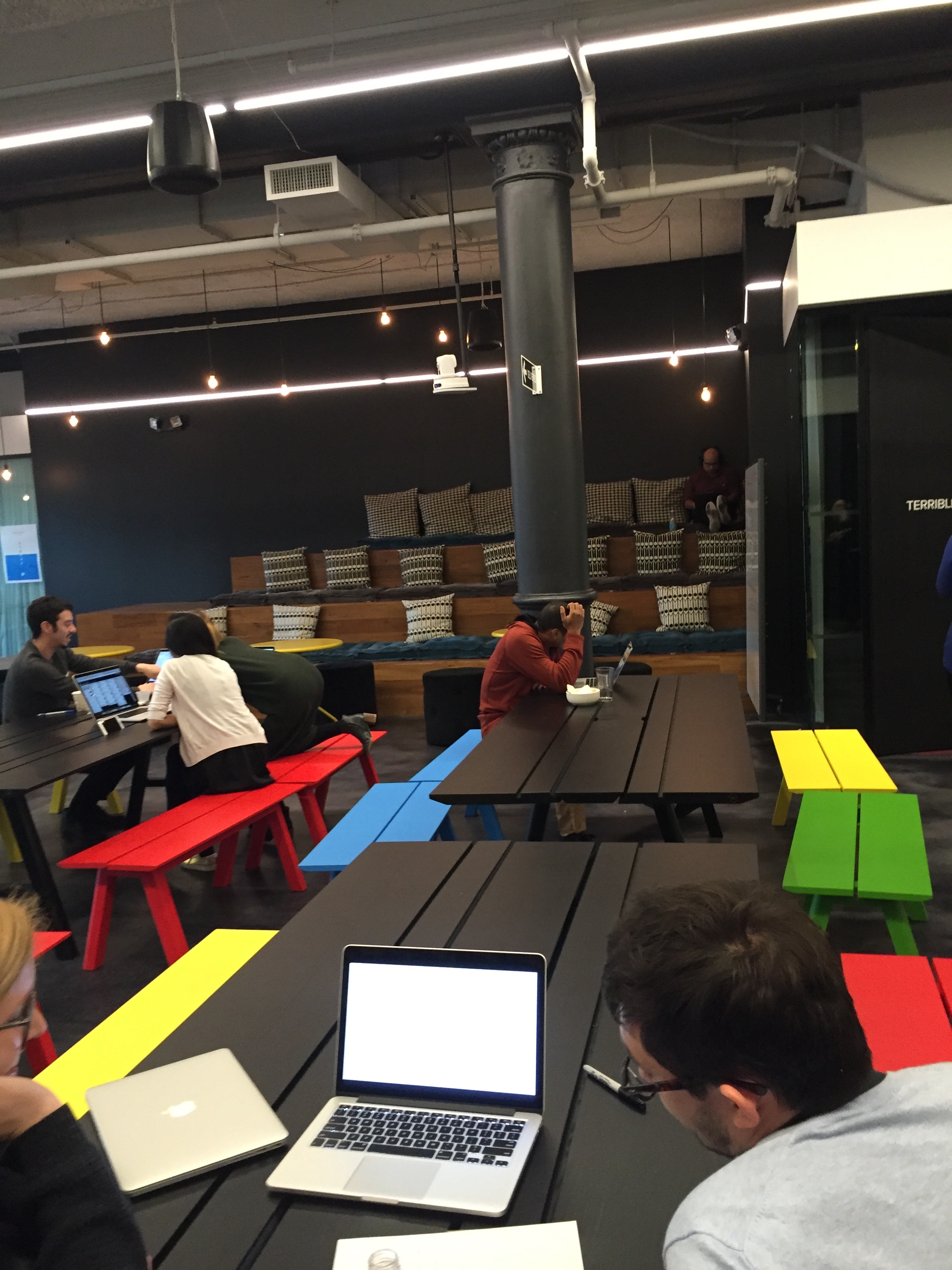
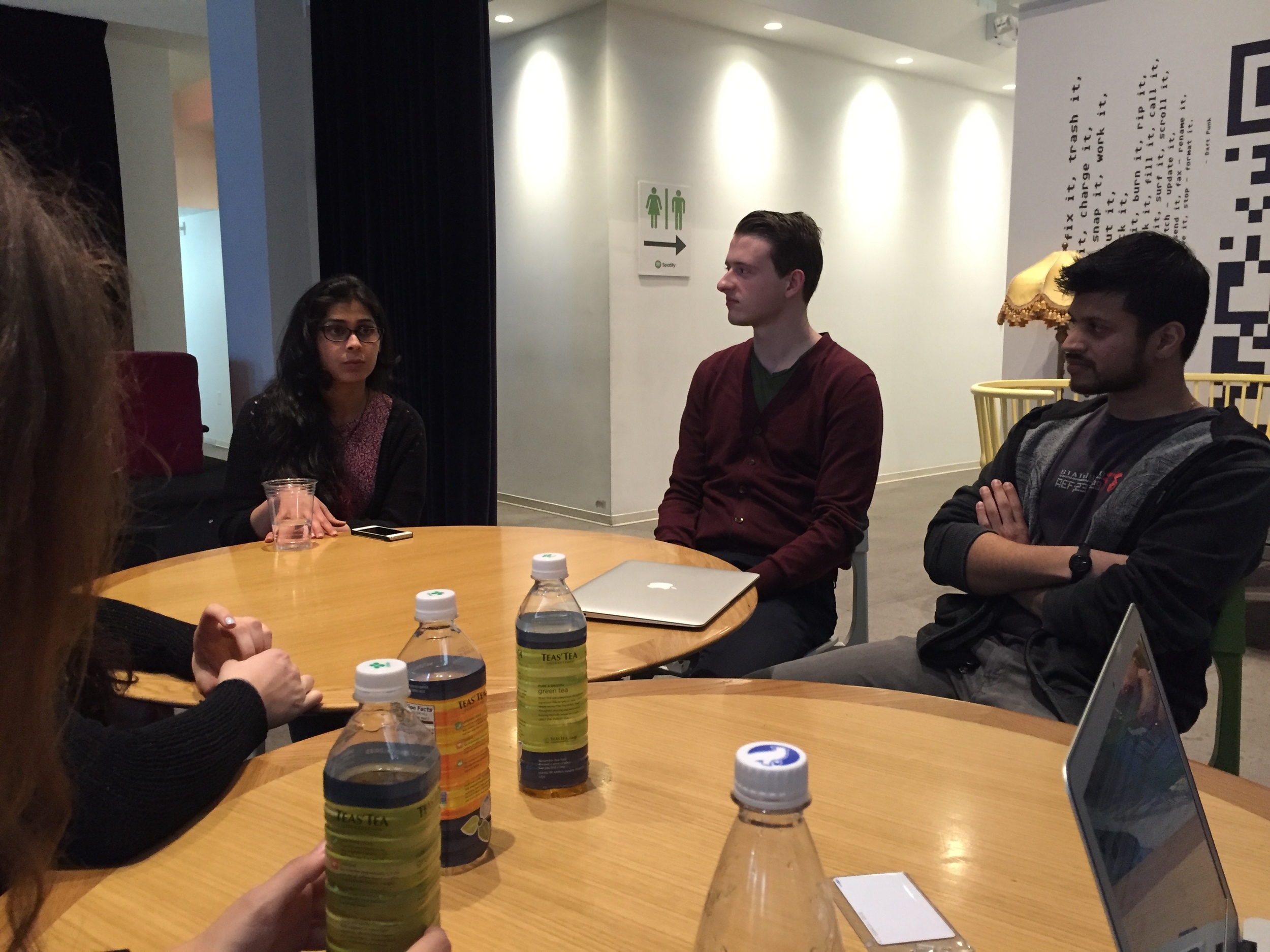
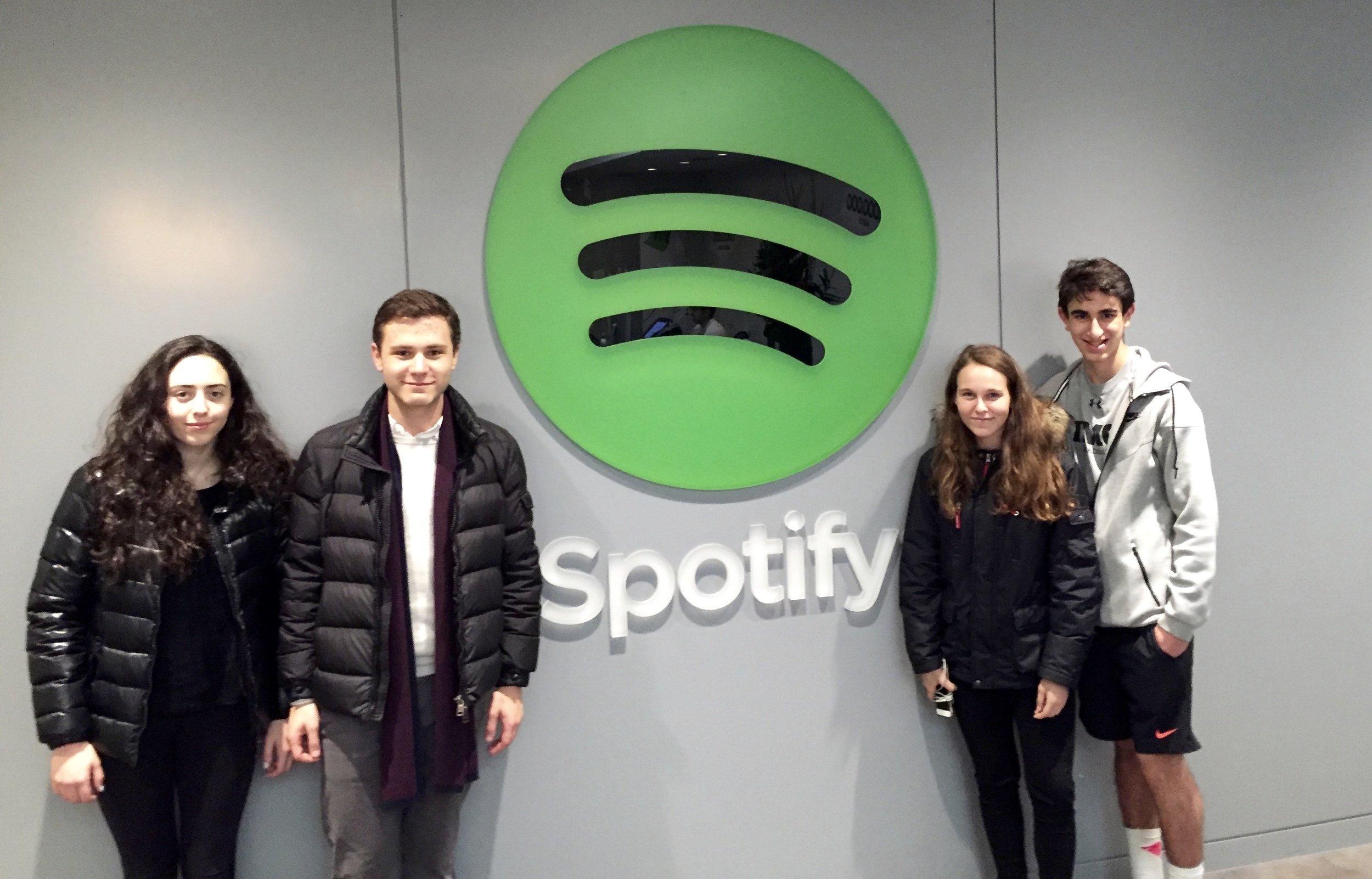
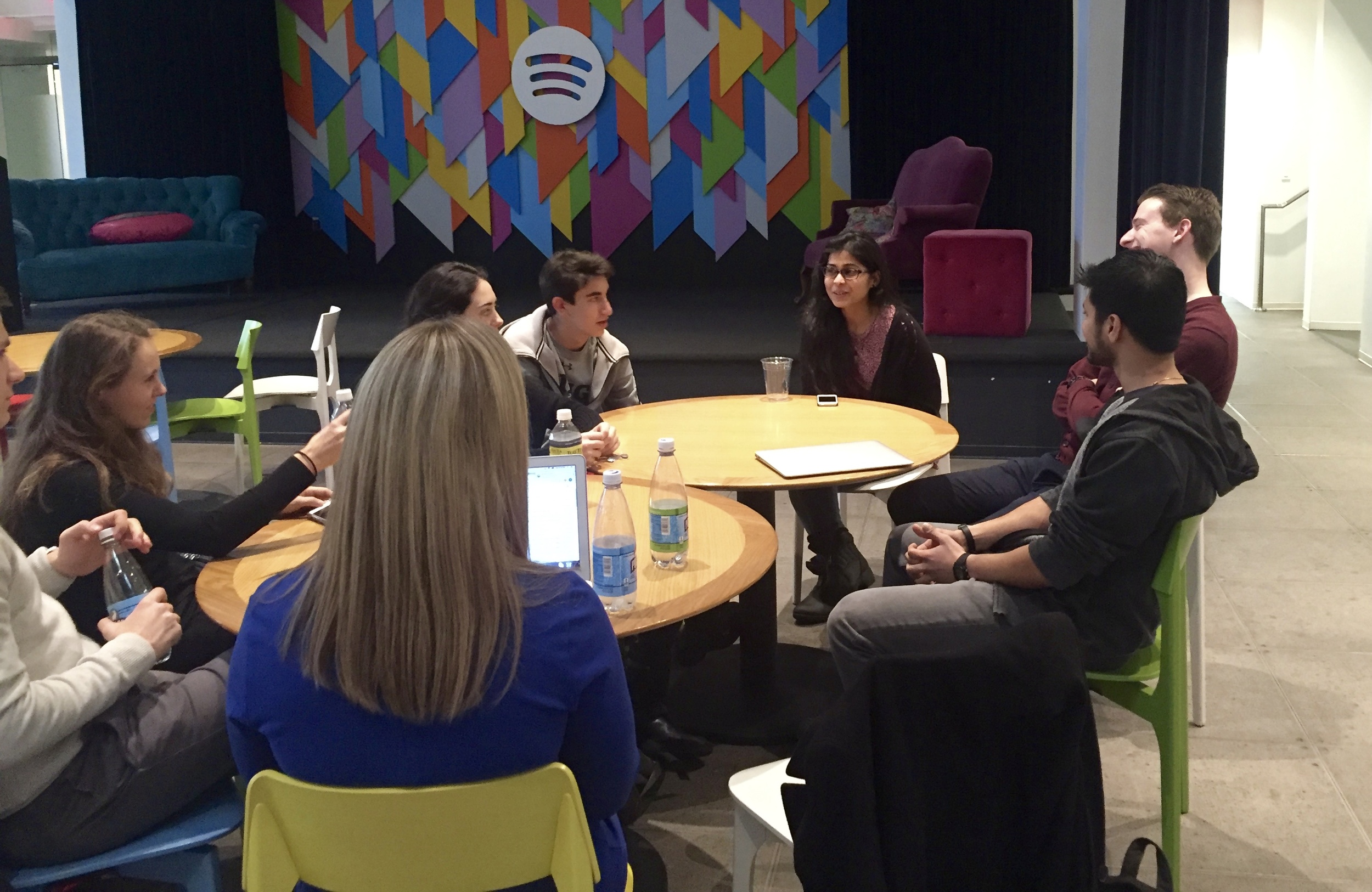
February 28, 2016 -- Google HQ: A Coworking Space for Entrepreneurs
Visiting Google’s offices was such a different experience from any company I’ve ever visited. The sprawling HQ, located in the artistic and startup heavy community of Chelsea, seemed to be a mashup of the stereotypical tech office with several parts grounded in purposefulness, something seemingly lacking in the typical Silicon Valley tech company. We walk in and the primary colors which compose Google’s logo line the open space as they sign us in with a computer, printing name tags for all of us. We enter the New York themed floor with road and subway signs lining the path through the interior of the block-long building. Our tour guide points out some stereotypically Google features: the ping-pong tables, the massage chairs, the abundance of kitchens each with a different theme (from lego to pacman), the ladders in between floors, and the test classroom, one that we were eventually led into for our talk and Q&A.
More interesting though was the discussion we had once in the test classroom. I found the structure of the company itself fascinating. To me, it seemed as if Google fostered a co-working space for entrepreneurs to pursue their passions and collaborate sans the fear of not turning a profit, being fired, or not being able to afford rent. People are encouraged to switch project, forced to collaborate on a team, and pulled from an array of subjects culminating in truly interdisciplinary collaboration. The Google employees are afforded a plethora of resources to create or improve their projects (I mean, they have all of Google’s resources!). I think Google’s success stems from its ability to create new and incredible ideas. However, this is only possible because Google fosters an artfully crafted environment of entrepreneurs and innovation, one that seems arbitrary and perplexing at times (your boss cannot promote you), but one that applauds success, reflects on failure, and lauds risk. --Andrew Blum '16, Founder
February 24, 2016 -- Trekkers Respond to their Google Visit
Our group first entered Google, and we were each signed in using their high tech computer entry system. One of the first things I noticed was the amount of men walking in and out of the halls. Everyone had their own agendas which in turn meant everyone was working hard to get their respective tasks in line and completed. We walked through the colorful, lego colored hallways to the test classroom where we had our q&a and got a debrief on Shawn's personal project, Google Classroom. One of the most interesting aspects of this discussion was to hear how much preparation and user feedback went into the final product we use everyday. I had never thought that every part to an application was first tested by a user group and then analyzed by engineers in order to see if it was user-friendly. -- Talia Sacajiu '16
Visiting a major tech conglomerate such as Google after visiting a smaller startup was an interesting change in perspective. We discussed a few different topics at Google: Google Classroom, their larger education initiative, and also the life of a Google employee. It was inspiring to learn that the Google Classroom team is truly focused on improving worldwide education and not focused on making money. In addition, the Google Classroom team seemed thrilled that other companies such as Apple were also pursuing the education perspective because it meant that there would be constant innovation in the education space. I was really impressed by this view as it really showed the employee’s dedication not just to their company but also to the market and users to which they are catering. Another major topic we discussed was the unique work style at Google and the role of computer science in terms of projects and job opportunities. The major takeaway of this conversation was that computer science isn’t necessary to get a job at Google or succeed in the industry. There are a large number of positions involving marketing, product research, outreach, business development, etc. This was really refreshing to hear because it really broadens the appeal of working in the tech industry and alleviated some of the pressure I had about being a good programmer to succeed. Although it was specific to Google, it was really fascinating to hear about how projects begin and grow as well as the process of transferring between projects. At Google, employees are allowed to transfer every 12 months to a different project and the average within the company is 21 months. I also really enjoyed the approach Google has to developing and releasing new features. Especially within the Classroom team, there is a lot of consideration and outreach when it comes to adding new features. Teachers themselves are consulted and the product revolves around user feedback. Another interesting persepctive was the team’s focus on making existing features more accessible and more readily available offline to serve developing countries rather than developing new features. Finally, we discussed the future of education and tech’s role in that. We discussed virtual reality’s (VR) potential in early childhood learning as well as how products like Google classroom are allowing teachers and students to be more productive, and better use of their technology. Getting such an in-depth look into one of the world’s biggest and most influential companies was really cool and an invaluable educational experience. Also, their office is awesome and has a Lego wall! --Ben Kessler '19
February 24, 2016 -- Shawn Buessing, a Google Engineering Manager, speaks to a question from a trekker, "Are you worried children have become too dependent on technology?"
February 23, 2016 -- Trek to Google HQ in Chelsea
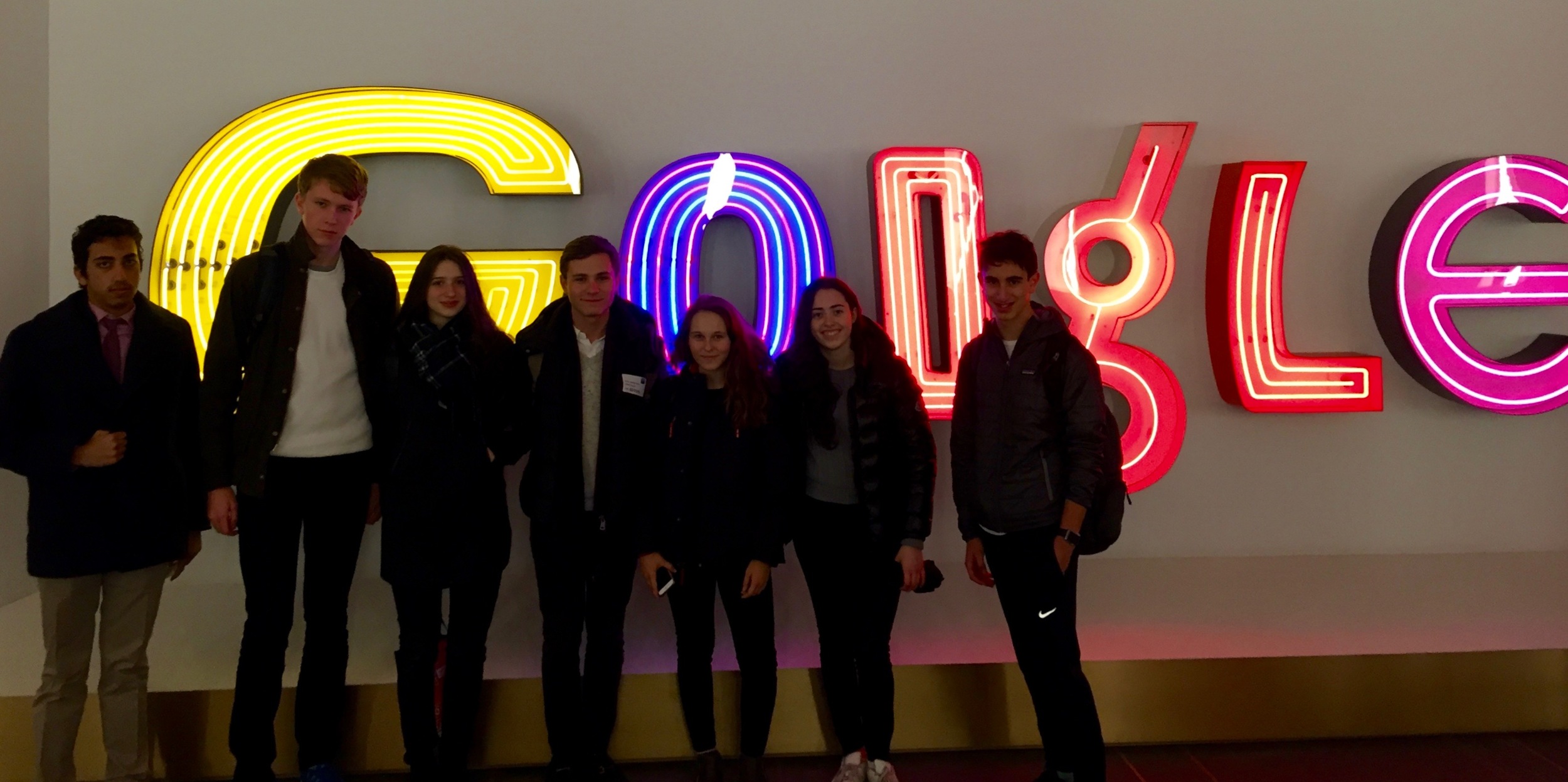



















February 6, 2016 -- Reflections from Silicon Alley Trek Participants -- Mass Lab
The first one is likely to notice at the Williamsburg offices of Mass Lab is an enormous white dog, whom the Chief Technology Officer referred to as "Smokey." Indeed, the office--a small, well-organized corner of the Green Desk building's basement level--can give one the impression of a largely laid-back atmosphere. Aside from a large bed for Smokey, some desktop computers, and a whiteboard with a few notes scribbled on it, there isn't much else to look at. You'd never know, from first glance, that this office is producing some of the software that dozens of other programs rely on.
Jourdan Urbach, Mass Labs' C.T.O., is a fast-talking businessman in the old style. A professional violinist and Yale graduate in his youth, he moved from the non-profit world to the tech industry to seek his fortune. As the C.T.O. of Mass Labs, his primary duty is management--he doesn't know how to code, but he does know how to hire a good coder, something just as important. The tech industry is often portrayed as a kind of "Wild West" of the modern era, from Jesse Eisenberg's The Social Network, detailing the rise of Facebook, to Silicon Valley, HBO's critically-acclaimed television series chronicling the lives of a group of introverted coders trying to survive in today's strange new business world. Jourdan, however, rejects this stigma: "Look where we are." Out of his tiny Brooklyn office space, Jourdan has created software worth millions of dollars. Most of the people in the tech industry, he says, are a great deal more competent than the majority of the mid-level executives in most Fortune 500 companies. This is the key: while you won't find many people wearing suits or putting together PowerPoint presentations, the tech industry is in many ways far more professional than Goldman Sachs or CitiBank. In their own way, pioneering entrepreneurs like Mr. Urbach are the new heralds of the American Dream. --Dylan Springer '16
My first Trek with Silicon Alley was an incredible experience. I had never considered myself to be super interested in the tech side of entrepreneurship, however our conversation with Jourdan Urbach inspired a new interest in the possibilities of tech start-ups. One of the most fascinating elements of the discussion was the evolution of the company from a video service to a platform for artists to receive more money for their content. It really demonstrated the adaptability and gumption needed to succeed in the field. I was struck by the passion and energy of the employees as they spoke about their goals for the company, and the industry at large. Although tech start-ups can be perceived as our generation’s gold rush, the creativity and strategy behind them have truly changed the face of 21st century entrepreneurship. --Jules Franco '16
Visiting Mass Lab’s New York Office was an extremely interesting and informative trek that not only focused on the technology behind Mass Lab, but also the process of developing a project and the importance of the right environment, team, and other essential qualities. One of the biggest topics we discussed was regarding Mass Media’s transition away from their initial platform to an entirely new one based on user feedback and industry change. This idea of changing one’s product based on user feedback really resonated with me. In addition, Mass Media’s development of a rich-media app framework to cut develop time on future products was a really interesting idea that definitely inspired me. The financial experience that Jourdan had and also explained to us was invaluable. Firstly, Jourdan recommended raising initial capital from Friends and Family before moving to convertible debt notes and then finally a traditional funding round. Jourdan discussed the ideal valuations and amounts of capital to raise early on, 250K at at a 2 Million valuation was one of his suggestions. Financing startups is an extremely important part of entrepreneurship so having this hands-on talk was really relevant. He also discussed how to meet these potential investors and other individuals who could help with establishing your company. One of the best places to start was to use lawyers as a resource to make introductions. Continuing to discuss turning an idea into a product, Jourdan discussed the importance of focusing first and building a good potential UX before trying to build a prototype. He explained that a well-though out and designed UX is a much better attraction to investors than a badly-working prototype.
One thing that is rarely publicized in the startup world is the difficulties we hear about successes and fails but never the difficulties of getting to be successful or even semi-successful. Jourdan spoke at great lengths about how challenging it was to find experienced, passionate developers who are willing to work for your startup. The solution to this is hiring developers online which usually comes at a 200% financial consequence. We also discussed how a majority of investors disagree with your company’s core principles and products meaning it is very hard to find investors who are willing to support you. On a more positive note, we discussed the importance of execution and doing as much as possible for your company yourself. In addition, Jourdan shared how working in an accelerator type environment, as Mass Lab did in Grand Central Tech, did not necessarily entail mass collaboration but rather moral support from fellow entrepreneurs during hard times. Visiting Mass Lab was very educating and gave insight into some of the behind the scenes actions and motions that startups and founders must go through to just get on their feet. Jourdan’s dedication to his end-users and partners really showed how important it is to build a product that is as meaningful as possible. The financial advice was absolutely incredible, as was the discussion we had about growing a business, product and team. Overall, this trek was extremely rewarding and a great way to start Silicon Alley Trek. --Ben Kessler '19
February 5, 2016 -- From Concept to Creation: Notes and Reflections From the Founder
Founding and participating in Silicon Alley Trek has been one of the most challenging and rewarding programs on which I have worked. After many applications from students all over NYC, I was tasked with choosing the few who could participate in the Trek based on their application essays responding to the prompt, “Tell us about at least two of your academic and extracurricular interests, and how they connect intellectually for you (Note: if this question aligns with your entrepreneurial interest, please speak to that connection as well);” and “Why Silicon Alley Trek? What do you hope to gain from attending this program? (150 words or fewer).” The responses were thoughtful and interdisciplinary, making connections across disciplines from technology and soccer to entrepreneurship and Spanish. The current passion that many of these students had for entrepreneurship resonated in their applications, and I was fortunate enough to give spots to ten students, one of whom I chose to be an assistant director.
Thursday, February 4th was our first ever trek! As a group, we were able to visit Mass Lab, a technology company born in the NYC incubator backed by J.P. Morgan, Grand Central Tech, in Williamsburg, Brooklyn. After debunking the glorified perception of the tech startup scene (yes, not every startup is filled with ping-pong tables and napping pods) and getting a sense of the day-to-day job of every employee, we sat down in their conference room to continue our conversation with Mass Lab’s own CTO and co-founder, Jourdan Urbach. He spoke of his experience acquiring startup funds, from no one other than Mark Cuban himself, the collaborative atmosphere of GCT, and how his idea for the company, which created and is now moving away from Ocho Video, developed and changed from his original idea. After talking in depth about Ocho’s transition as a company and Jourdan’s own trajectory as an entrepreneur, we had a Q&A in which students asked remarkable questions regarding how Ocho and Mass Lab came to be and its future as technology evolves.
After experiencing this program and the interest it generated in students, I can say that this first trek was a success. Many students do not have an outlet to express their entrepreneurial interests and if not given the proper outlet, it could easily die out or be put on the sidelines as a student explores the plethora of other options available in college. However, by allowing the NYC entrepreneurial scene and successful entrepreneurs to become accessible to students whose passions in the area are currently burgeoning, the Trek has helped to encourage and reinvigorate students with entrepreneurial drive.
February 4, 2016 -- Silicon Alley Takes Its First Trek to Mass Lab, Creators of Ocho Video



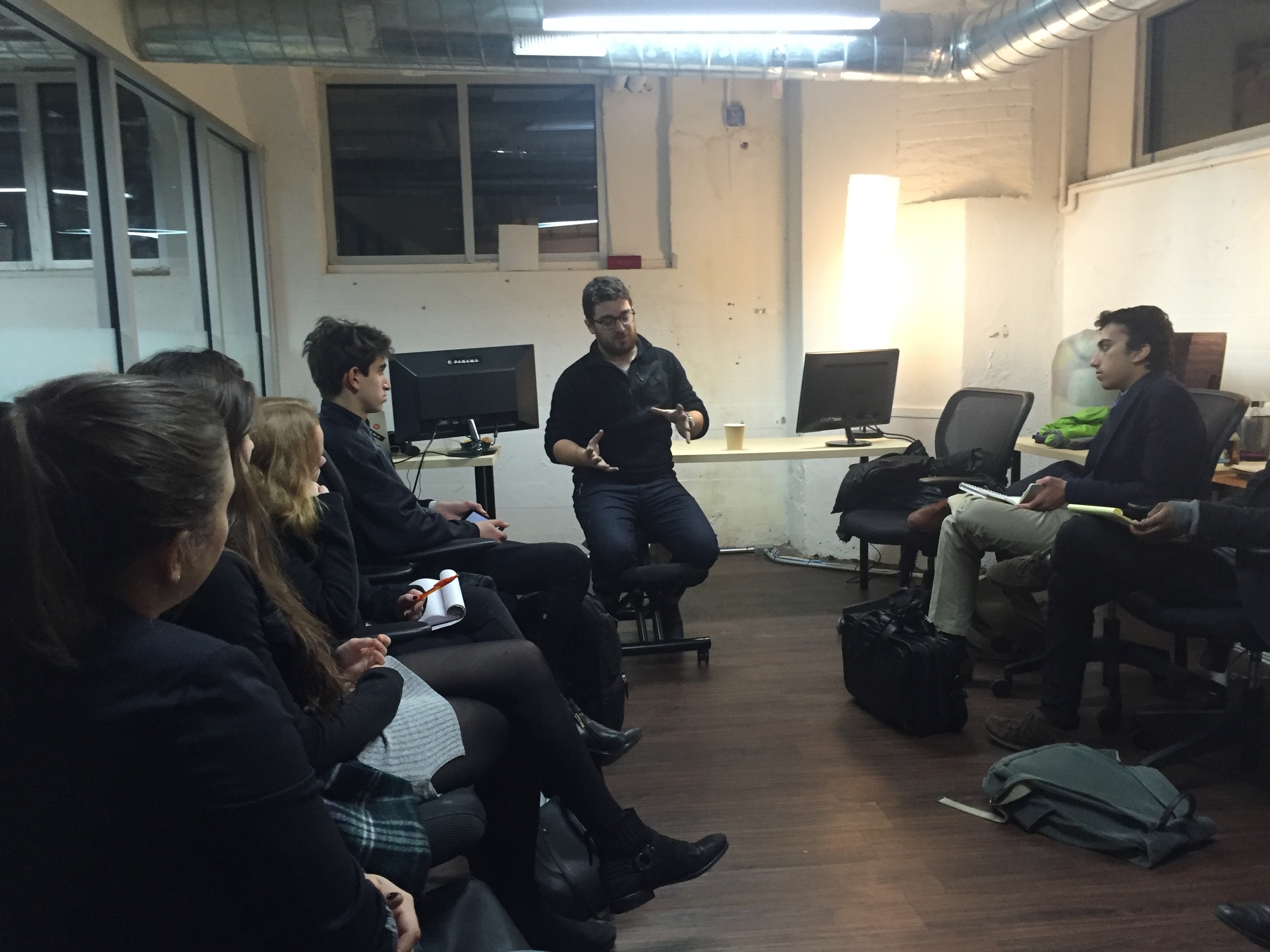



“An idea is worth nothing unless you can execute it.”
An Abridged Q&A with Jourdan Urbach
Q: How does your platform produce more dollars per view than Youtube?
JU: It’s a different system. On Youtube you’re going to have advertisers who are adding their videos on top of your content. On our platform there is no advertising and creators are going to set their own pay rolls for their content.
Q: So where exactly is this money coming from?
JU: You, the user. I can put up content for free as a user, but I can also put up content that costs half a cent and when you watch, you watch half a cent leave your bank account; we believe this is something people are willing to do.
Q: You have raised over $1.6M in seed funding from Mark Cuban among other distinguished investors, so I was wondering if there was a time when you we’re getting rejected by investors and if so, why do you think they rejected your idea?
JU: I would say 95% of the investors we spoke to rejected us before we hit that 5%. A lot of times rejection comes from people disagreeing with your core premises. Some people don’t think paying per view on the user end is a good idea. Otherwise, rejection comes from your business being out of scope for the investor, and they just pass on it.
Q: You mentioned how you pivoted Mass Lab from the creation of Ocho to a youtube-like product with background architecture. In the future, do you think you will pursue a new business once, or if, this takes off or do you plan on staying with Mass Lab?
JU: I don’t plan on working somewhere else and my resolve to stay would be increased were our platform, Portal, to take off.
Q: I was just asking because I know some entrepreneurs who get bored or love starting a new business, but leave after it grows out of the startup phase.
JU: I have a fiduciary duty to the people who are shareholders in this company to do what is in the best interest of this company, which means that unless it is in the best interest of this company, I can’t really leave. But I also wouldn’t want to.
Q: What, if any, is the role of private equity in startups, specifically tech startups?
JU: MMMMM. Murky. Private equity has been getting more involved in pre-IPO funding which is for companies which are already generating enormous amounts of revenue and need more money to keep them going until they can be offered to the public in return for value to the shareholders, an IPO. Pre-IPO funding in the past has come from large venture funds, but where is the money that is most volatile next to venture capital? Private equity, where people routinely make deals to buy companies for $4M and flip them within 3 years. So private equity starts getting involved in late stage pre-IPO funding where enormous capital injections are important, but the strategic nature of where that capital comes from is not as important. I predict it will continue to do so, but become regulated within a few years, which I disagree with on principle. When you put money in private equity you’re expecting a certain amount of risk. When you put your money in venture capital, you’re expecting a different amount of risk and to conflate those risk factors is in my opinion a level of fiduciary incompetence.
Q: You talked a lot about Mass Lab, but do you think the development of Mass Lab was due to your development as a company at the incubator Grand Central Tech, and how have the other companies influenced your product or work?
JU: So just some quick background: Accelerators provide companies with either access to funding, mentors, office space, or some combination of the three and Grand Central Tech is the premier tech accelerator in NYC. GCT is unique and extraordinary in that it does not take any equity from the company. We spent a year there with 14 of the best startups in New York, so we had already developed Ocho, and were there to launch it and pivot after the video-sharing market fell through. The space has been very supportive through very difficult times. We actually had a big expansion when we were there, and we decided that, after staying in the coworking space owned by GCT, we would leave that community and come down here [to Williamsburg] to pay extremely little on rent, be closer to our creators [developers]—who are across the street—, and to be closer to the core user base, creative people.
Jourdan Urbach tackles the question, "How should an aspiring entrepreneur use his or her time in college?"
Jourdan Urbach’s take on the “wild west” hecticness portrayed by media about the startup world